#it is meant to be taken both seriously and thematically while also having that. little sprinkle of oh. doomed yaoi/yuri. you get it
Text
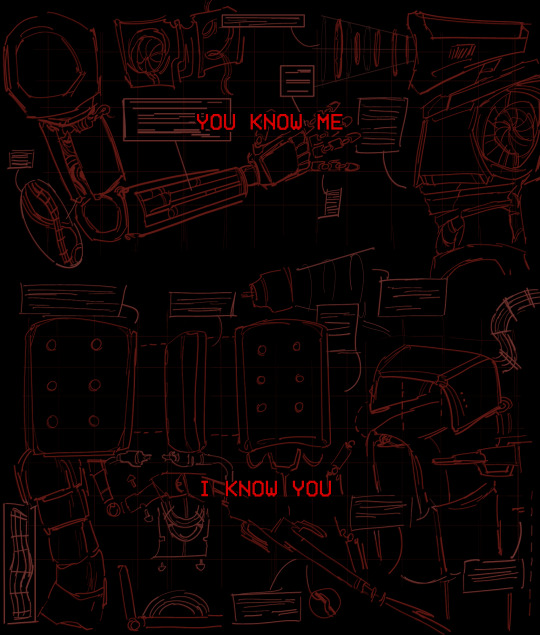

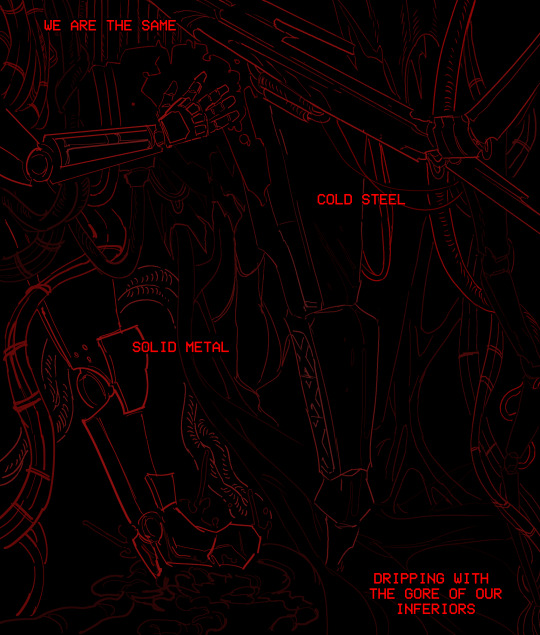
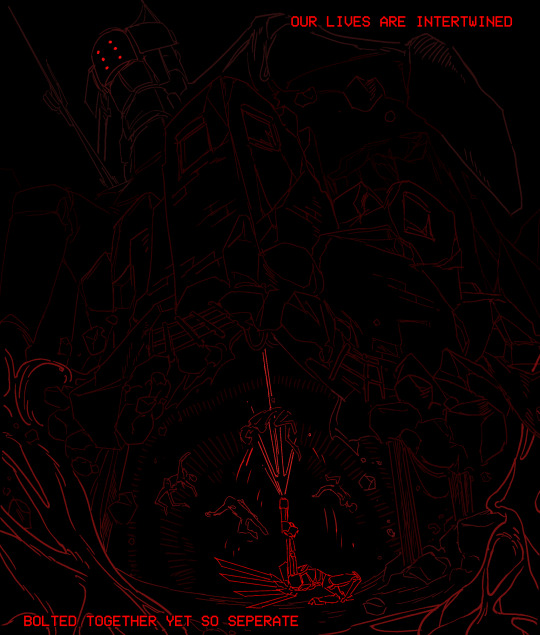
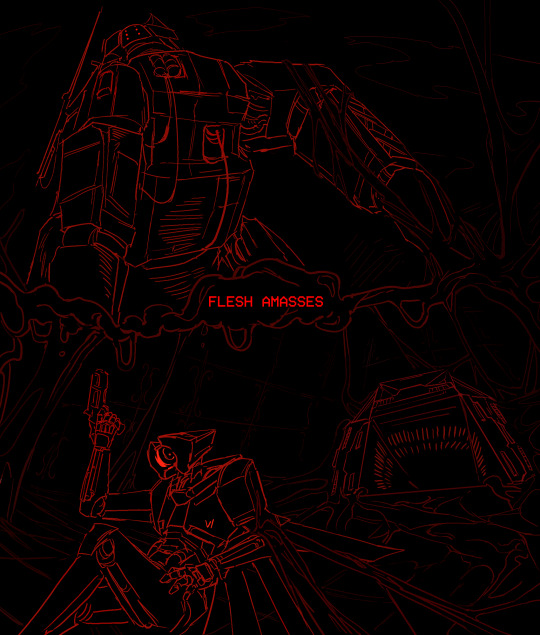


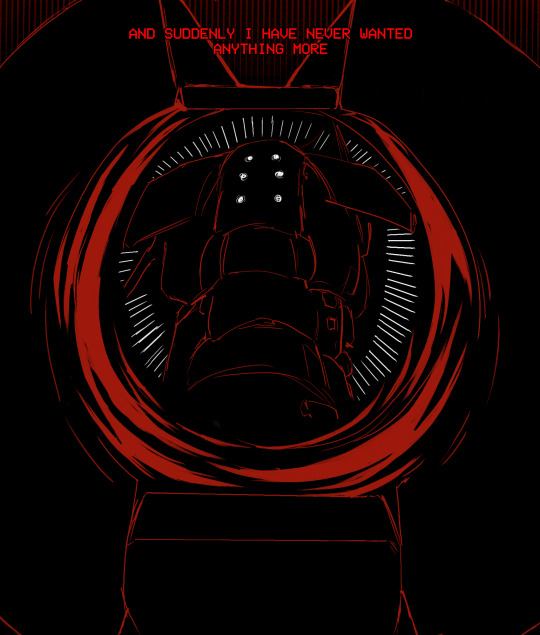
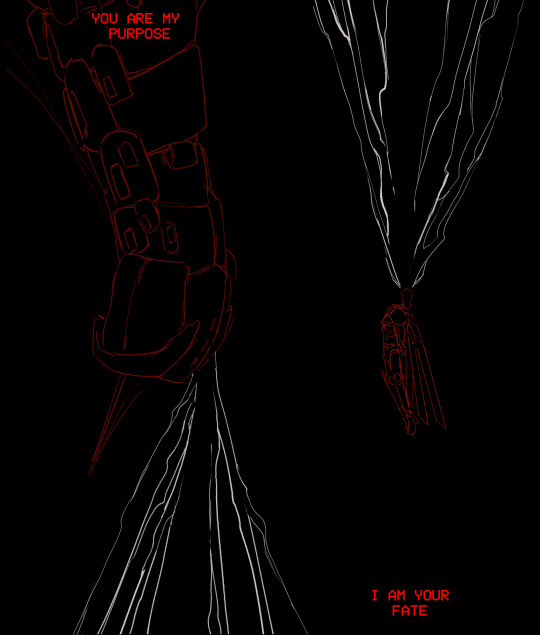
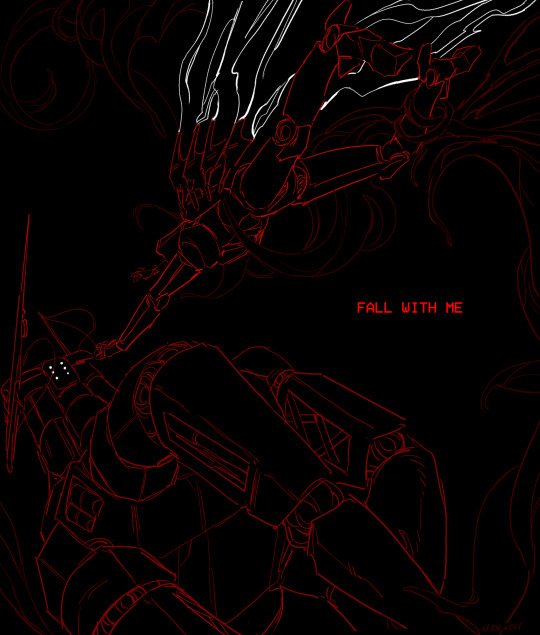
I WAS MADE FOR YOU // YOU WERE MADE FOR ME
#ultrakill#earthmover#1000-THR#v1#violence layer#god. they mean so much to me#what the FUCK is up with the violence layer#theres so much shit. its so good. ohhhmyyy gggggg#their dynamic is insane to me. i cant just make one piece#gen art#object loving object...#weapon4weapon.........#take this comic as you will though#it is meant to be taken both seriously and thematically while also having that. little sprinkle of oh. doomed yaoi/yuri. you get it#by 'i have never wanted anything more' it was mainly to describe v1s instict to take the earthmover down and kill it-#but it can mean whatever you want it to mean
8K notes
·
View notes
Note
I like your post about gray morality in video games! On the other hand I wanted to add that the gray decision-making you're talking about can have its own pitfalls (distinct from the pitfalls of centrist/apolitical "both sides are bad" apathy). I'm thinking of gritty action heroes who are presented as morally gray because they're pragmatic enough to torture and kill in the name of Truth, Justice, and the 'Murican Way, or just in the name of a macho revenge fantasy. To be clear, this isn't an indictment of gray morality, which I love when done well. Hell, the stories I'm complaining about tend not to be THAT gray in practice, as the bad guys are often SO exaggeratedly bad that there's not a real question of whether the hero is willing to Do What It Takes in the end. My point is more just that that's what people often mean when they condemn "gray morality."
Hi! Sorry this has been sitting my ask box for a while, I got busy and didn't want to just dash off a response.
(We're talking about this post, for those who haven't seen it. RIP my notifications.)
Anyway I'll just say here for the record that yeah, gray morality in fiction can be done poorly! While the line for "done poorly" is going to be different for everyone, I can certainly think of examples I've disliked.
(This got long, sorry in advance. 😩 Also, spoilers for Fallout 3 and all the Dragon Age games, if anyone cares!)
My go-to example of one I think is a real stinker is the Fallout 3 DLC "The Pitt" where the critical decision is... whether to free a bunch of people from being enslaved in horrible conditions! But! in order to free them, you have to kidnap a baby from... the enslaver. Because something something the baby's genetics are the key to curing the illness that afflict the slaves from their horrible working conditions... you don't actually have to hurt the baby, though, she'll be fine. She'll just be taken away from her parents. Who are, again, slavers. I promise I'm not making it sound any stupider than it sounds in the game itself. :P Like the whole concept of putting an infant in your video game inventory and making a break for it is just a little too wacky for me to take seriously, but it feels like you're meant to take it seriously, and apart from trying to inject some ambiguity into the decision, I'm not sure why the whole baby plot would even be there. Honestly, Fallout 3 isn't a game about moral ambiguity. (I think both New Vegas and even Fallout 4 do that kind of thing better.) Most of its major decisions boil down to "Do you want to do the Good Person Thing or the Evil Bastard thing?" That's the game. No one is trying to inject moral ambiguity into blowing up Megaton. It's just a thing you can do if you want to roleplay an Evil Character. I love Fallout 3, I'm just saying, that's what it is. And I think "The Pitt" would have been both more thematically appropriate and less stupid if it had just skipped the whole baby plot and been like "Hey! Do you want to be the Good Person who frees the slaves, or the Evil Bastard who allies with the slaver?" It's morally simple, but the thing is the baby didn't actually make that story or the decision any more interesting to me, so it might as well not have been there at all.
But Fallout 3 isn't the kind of thing I was thinking of when I made that post. I was thinking a lot more about things like the decisions in the Dragon Age games, which don't usually fall neatly into The Good Option and The Evil Option, and are more likely to ask the player to make their own judgments. And a common criticism I see of those games is that they're "centrist" and try to "both sides" in-universe issues because the game doesn't explicitly tell you which choice is The Good One, or it doesn't explicitly reward one choice and punish the other, and that's... not really an interpretation that I generally agree with? But that's a much more involved discussion, honestly. At some point, I'd like to write a post about how I feel Inquisition presents the mage rebellion, because it's such a big topic and big game (and by "I'd like to" I mean... I already have a draft started, whoops). That's just more than I have time to get into today!
But I will say this: I find the plot decisions where you're given an obvious "best option" to be the least interesting choices in the Dragon Age games. The Redcliffe decision in Origins is the most obvious one to me, where I think the option to save Connor from possession should at least have been much harder to find, because in the lore, the fact that mages even can be saved from possession and not just killed is widely unknown because it goes against the templar party line, and the fact that Ferelden's First Enchanter is just like, "Oh yeah, sure, we can totally do that, pack up the lyrium boys" just doesn't really mesh with everything else we're told about the Circles and conventional wisdom on magic. Plus, the fact that there's no consequences for leaving Redcliffe for days with Connor possessed just... makes the decision too easy, for me, because in-universe it feels like it shouldn't be that easy. There's also the werewolf decision, wherein the Lady of the Forest just tells you straight out that Zathrian can break the curse with his own death, presenting you with a "best option" that it feels both stupid and sort of comically evil to disregard (like, from a purely pragmatic standpoint why would you fight the entire pack of werewolves or an entire clan of elves when you can just make Zathrian solve the problem here and now).
The ending decision of DA2 is an example that I feel has a really stark moral contrast to it (which I've discussed before), and one that I think does place certain constraints on role-playing, but in that case I think it's appropriate to the themes of the game, so I don't mind it.
But my favorite plot decisions in Dragon Age are things like the Landsmeet, the Winter Palace, and even the Orzammar quest line. Not just because I love fantasy politics, but because you have to work with what you're given in a way that feels realistic to the setting and the story. No matter how much of a hero you are, you can't waltz into Orzammar or Denerim or Halamshiral and brute-force a perfect solution. Unless you're a dwarf yourself, you're an outsider who doesn't know anything about dwarven politics and no one is particularly forthcoming about the situation because everyone has an agenda! and yet you have to solve this conflict in order to get aid against the Blight. You have to make a decision based on very little information and almost none of it concrete. At the Landsmeet, you may want justice, but it's your word against Loghain's with no proof of what really happened at Ostagar, and if you want to win you need provable charges, you need to show the nobles that you support their interests and not just your own, and no matter which butt you put on the throne, you're faced with the very real possibility of another succession crisis a few decades on so congratulations, you've just kicked the can down the road.
And oh, the Winter Palace, my beloved. You cannot make Briala the Empress, no matter how much you might want to! You cannot abolish the monarchy. You cannot force Orlais to relinquish the Dales and re-establish the Elven state. Your options are: keep the empress whose reign overall has been sympathetic to elves and commoners and relatively diplomatic toward her neighbors, but who also may have just done a good old fashioned massacre to crush a rebellion and maintain her power; let her be killed and put the militant expansionist on the throne; get Briala and Celene back together (maybe with the hope that Briala will continue to influence her); help Briala do a blackmail which surely will work out totally fine and not backfire in anyway; or force them all to shut up and play ball for now, basically just kicking the can down the road. None of these options are perfect by any means! There are interesting and believable in-character reasons you might choose to role-play any of them. And every one has the possibility of unforeseen consequences later on, positive or negative.
I made the original post, in part, in response to condemnations of the kind of decisions I enjoy in these games. And at the end of the day, it's okay not to like those decisions, to prefer more unambiguous choices or more room to indulge in the fantasy of fixing everything. But that's not always the kind of story a game is trying to tell, and I think that's fine, and personally I enjoy the complicated decisions more. And I feel like sometimes those complicated or ambiguous choices are read as if they're either presenting all options as morally equivalent when they're not, or that they're "punishing" the player for a choice if it has any kind of negative outcome, and I don't think that's the case! I think it's fine and good in fiction to explore the ways in which trying to change things for the better can be difficult and how a choice with some negative consequences may still be the best one available, and so on and so forth.
Anyway, I hope I didn't get too far afield here, and thanks if you read this far!
#gray morality#this is so long i'm sorry#anne apocalypse making you sorry you asked since 2011#blunders of thedas#fallout 3 critical#prewar parkstrolling#ask anne#who cancelled roger rabbit
38 notes
·
View notes
Text
Just binge read the Bone Season series by Samantha Shannon and !!!!!! amazing. Now I want to yell about it for a bit, bear with me (essay incoming sorry)
- the concept already, urban fantasy dystopia, just feels both so fresh and so obvious it's surprising it's not more of a Thing, and the world building is next level. the modern technology + Victorian aesthetics is not just cool (although it is) it evokes the fact that Victorian England was a brutal, very unequal and fucked up society, so it really fits a dystopia. Plus Scion is also an evil empire that invades other countries, which is also thematically relevant, as is the fact that the MC is Irish.
- I'm obsessed with the concept of a magical mob and Underworld (unsurprisingly) and people who are pushed to the margins of society because their very existence has been outlawed and bond together to find freedom but are also forced to exist in a state of constant brutality and the damage it all does
- the first book throws a lot of plot and world building at you in ways that can be a bit overwhelming and confusing, and doesn't give you a lot of time to connect emotionally to the characters, so that took me a while, but it's really worth pushing through for, i love them all now.
- I love the main character, Paige, so much. she's a survivor ; clever, witty, action oriented and very down to earth ; she's also very competent in ways that feel earned, and interestingly flawed, not some gratuitous emotionless Strong Female Character with plot armor or a 'not like other girls' complex. She's proud and she has a mean, ruthless streak. She's brave, too loyal for her own good, and impulsive to the point of recklessness, and sometimes her gambles pay off and sometimes she has to pay a very heavy price for them (it made me yell at the page several times). It's really cool to see a female MC that is so invested in the politics of her world. I hate that so many female mains in fantasy or dystopia are these isolated loners who hate politics, only really care about a handful of people and want to retire to their husband/2.5 kids happy ending as fast as possible, with a plot-line that focuses over personal development rather than political goals, because it sends this weird message that women are not meant to be in the public space. (Not making this into a rant about the Shadow and Bone books but lol I could)
Paige has to shoulder massive burdens that nobody in their right mind should want and that's understandable, but you do get the sense that she enjoys being a criminal, running free and scheming and climbing over roofs and outwitting her enemies and sticking it to the government. She doubts herself sometimes, worries about people only valuing her for her powers, but she doesn't have a lot of time to waste on self-consciousness, angsting or moping about her feelings. It's very empowering to read. And she's fiercely compassionate in moments where it's actually very dangerous for her to be. She has this constant struggle between the part of her that finds injustice intolerable and the part of her that is grimly pragmatic. This is exactly what women in fiction have been excluded from for too long, complex dilemmas about action and morality taken seriously, not just love triangle shit. It's great. Although wow does she deserve a break. Ouch. Baby </3
- the world is incredibly fucked up but there seems to be no sexism/homophobia/racism, which is refreshing to read. the main romance is m/f but there's a lot of ambient queerness, just because and not to 'make a point' ; the author has confirmed that the MC is demisexual, her bff is gay, the love interest is pan, there's a badass trans commander/mob boss, you get randomly informed that this henchwoman has a wife or that this mobster is trying to save his boyfriend, it's great (and it's not a word-of-god after the fact thing like jkr it's actually shown on the page, they just don't use any labels)
- the main romance is a slow build that is very low-key at first, enemies to reluctant allies to friends to lovers, but becomes really powerful over time. the fact that the MC is demi means it can't rely on 'omg so hot i can't stop thinking about him!' clichés - nothing wrong with attraction at first sight but it often leads to lazy storytelling and irritating instalove, tell over show romances. the characters are drawn to each other but it's more of a meeting of minds and souls at first, admiration and common goals, and their actions are still first and foremost guided by strategy, not sentiment. (sidenote I've often wondered if i wasn't at least a little demi myself. that would explain why i have such high standards for credible romance lmao.) also there's a significant power imbalance at the start but it gets very much deconstructed before anything can happen and it's an interesting negotiation. Warden could easily have fit in the 'brooding immortal douchebags' category but there's an alienness and gentleness to him that lifts him above that, along with the respect and space he gives to Paige and their shared experience of trauma and hopes for a better world. Her hot-headedness and his calm, deadpan sort-of-humor play off each other really well. Also I love the idea that develops over the series that their connection isn't a distraction from their fight but that it makes them stronger and allows them to resist and find solace from the deluge of constant horror that is their world. their whole dynamic in s4...no words. also the second time i read a scene where one character is bandaging the other's wounds and there's touch aversion involved and like, I LOVE that.
- lots of complex different bad guys. some are just brutes, some are sadistic masterminds with superiority complexes, some are deceptive and manipulative and morally ambiguous. love that the Big Bad Guy is a woman - female characters being fully realized means that sometimes, they're just incredibly evil (as long as it's not tied to their gender, i love that). Paige and Jaxon's relationship is fascinating - he's a terrible, manipulative person but i do feel in his own way, he cares about her and wants to see her thrive ; but that's not necessarily a good thing as he sees it as a justification to make her go through awful things. She knows he's awful but she can't get over the fact that he took her in, taught her, believed in her and gave her a sense of belonging and freedom when nobody else did ; she was super proud of being his mollisher and it makes sense it would take time for her to rebuild her sense of self without that, on her own. I like that the ambiguity isn't resolved (it's also a very good illustration of how emotionally abusive parental dynamics can get their hooks in you). The fact that he's aroace really works there too, could have been a lot creepier otherwise and i feel that's really not the point.
- also it's really cool how each book really feels like its own thing, it never feels repetitive, there are huge twists and a shift of focus each time - the penal colony in Oxford in the first, the London Underworld in the second, traveling through England in the third, Paris in the fourth, etc. The pace is pretty breakneck and i wasn't bored for one moment - actually at times i would have liked more quiet moments w the characters. There are two novellas that focus more on that and the second one is an exploration of trauma and recovery that's particularly hard hitting and beautiful. The first book does feel like a beginner novel, it's a bit clunky in terms of exposition, pacing and character development etc ; and there are moments where all the violence and brutality feel a bit repetitive ; but overall the story builds up so beautifully and in so many complex ways it's just really worth it and it's not for nothing i read the four books and two novellas in five days. just have to wait for the next one now though argh
- anyway more people should read it
#the bone season#samantha shannon#book reviews#paige mahoney#bookblr#the mime order#the song rising#the mask falling#ellie reads things
43 notes
·
View notes
Text
The Fiasco Finale of Future [1/2]
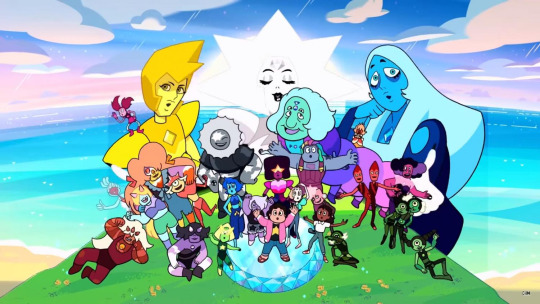
So in the penultimate episode of Steven Universe 2, the climax of both the season and series as a whole... is a group hug. As I expected, plenty were not too pleased with this turnout. Some felt it was anti-climatic, some felt it was resonating, and others tried to own the critics by digging deep into the scene like they always do sucking this show’s co- Coming from nearly a month later, I’m... split. One hand, I didn’t mind the climax. On the other hand, it was pathetic compared to plenty of other finales I’ve seen in media. It’s like this show as a whole, I enjoy it, but I also enjoy smacking it upside the head cuz it made some Karen-esque, All Lives Matter type stupid shit that I just cannot get behind. So you know what, Perry the Platypus, let’s mix it up. I wanna express the good and bad of this climactic end to the show and see where we can go from there. You ready?
What’s Good:
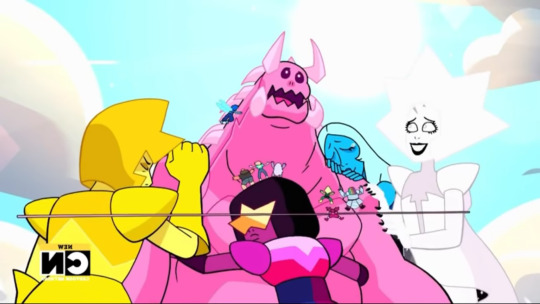
You truly wanna know what makes that final hug a great scene? A real showstopper? I have the truth, the best truth behind this, you won’t believe me but here goes. The climax worked because A Hug Is Nice. That’s it, there’s nothing else to it beyond a hug being nice. “But Monkey, you incel troll, there’s should’ve been more to that. The episode shouldn’t have taken that long to get to that point.” Well, in typical fashion, let me put it this way by talking about Spider-Man 2 (better than Spiderverse, don’t @ me). The whole movie is centered around Peter’s life getting shat on. He’s getting fired left and right, his people are abandoning him, he even loses his powers, he’s just at his utter lowest. But at his apartment, while contemplating, in comes his landlord’s daughter, Ursula, who offers him some chocolate cake and a glass of milk.
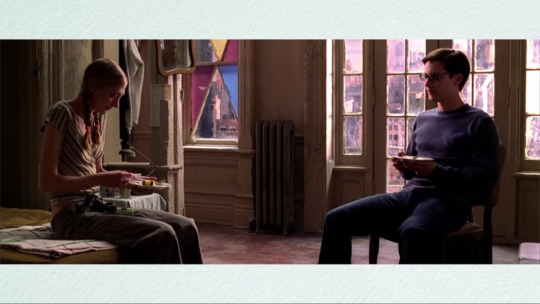
We can say the scene comes out of nowhere and that this is all that happens, feeling pointless, but I say this is an important scene because after everything that happens to him before, this one gesture from somebody out of nowhere to be honest was one of the nicest things he’s received in a while. It’s the seedling of a scene that keeps Parker going before Doc Ock comes to make him truly spring back into action. Above everything, it was nice. Like a hug.
I don’t need to be philosophically deep with SU2′s meta to tell you that a hug can be a worthwhile thing to get more than anything. It doesn’t resolve all the baggage Steven has in his mind, but a group hug from the people closest to you (and the Diamonds) can be a gesture so nice, it can numb you out, if only for a moment. Only other times where Steven got a hug was when he felt everything could be okay. With Lars, Peridot, and Connie after her “rejection”, and it’s after that “rejection” where he slowly loses it in his attempts to shake off that harsh feeling of abandonment and that everything can be okay. It is something where he can turn to the others for help but the concern of their response makes him reasonably suffer in silence. That last part is a little dumb, but I’ll get to that later. He can’t really hug himself because it doesn’t work like that. The point being that Steven, at his lowest, just needed something nice to consider. And a hug from everyone who loves him (and the Diamonds) can be that piece of chocolate cake he needed to be at ease, again, if only for a moment.
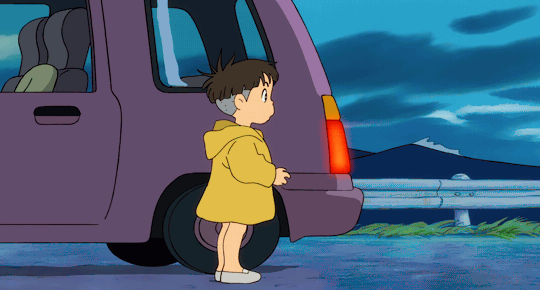
Like let me tell ya, as a deliriously depressed man that constantly wishes for death, a hug shouldn’t be spat on. Whether it be from your friends or mommy, a good hug can, at the very least, keep you sane and going. It isn’t medication, let’s not get it twisted, but a healthy remedy nonetheless, especially if you’ve ever felt touch-starved like I have before. It’s an affectionate gesture that for what it’s worth, should never be taken for granted. And while Steven could’ve well gotten this big type hug at almost any time he desired, I can at least appreciate the show for saving that at the right time. Whew. But, while the moment itself is nice, it’s predictably almost everything around it that unfortunately puts the moment in a vacuum and me with a bad taste in my mouth.
What’s Bad:
Let’s get this out the way, because I’m such a literal bastard... *inhale*
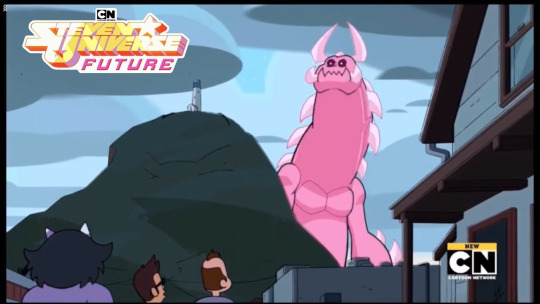
Penis. Penis. Penis. Penis. Penis. Penis. Penis. Penis. Penis. Penis. Penis.
MUSHROOM! MUSHROOM!
Congrats on those with the corrupted!steven theories who no doubt had it hard on when this horned trunk ascended, hung its head high, and beat its meaty chest with blind rage, the crewniverse certainly had the balls to go with this design and a long discussion of utilizing Monster Steven’s full potential. And if you think I’m nasty about this, hoo boy, be glad that words are all you’re seeing right now because artists no doubt had a field day potentially ruining this design for you even more. I’m surprised Tumblr’s flagging system hasn’t taken down whole posts with this. HEHEHEHAAAAAAAA!
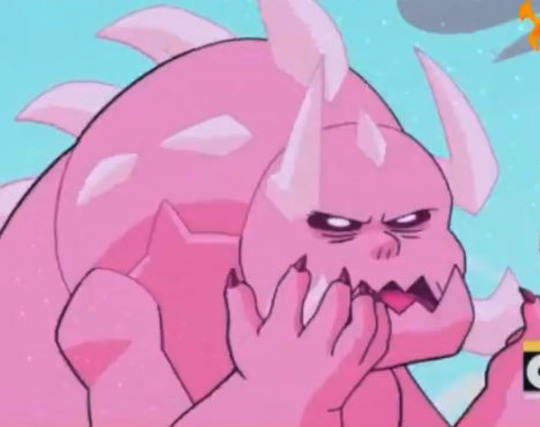
As you can probably tell, I’m not a fan of this Diamond Dinodildo’s design (say that 5x times fast). I mean Rebecca could be as horny as she pleased with this show, but this is next level, I tell you. But seriously, it honestly sucked that this is what they came up with when it served no purpose to Steven thematically other than him being a literal peen of a monster. Said this before, but what does becoming a corrupted looking amalgamation mean to him beyond “he’s a monster”? Corrupted gems weren’t the worst things in his world, they were products of a even worse thing. Turning into a diamond like figure would’ve said something about the cycle of abuse making you not feel like yourself, but a reflection of who you not only resent more than anyone, but were the indirect causes of your newfound issues. That would’ve took his struggle in the Diamonds Days arc to its next logical extreme, and brought most of Future’s episodes centered around Steven’s issues to a sensible turning point. Being a warped Diamond version of himself would’ve meant finally embracing inhumanity, and that would’ve conveyed the peak of Steven harshly feeling less like a human over the course of the season, especially when we had several episodes and new powers centering around him being inhuman. And a previous episode had him try to shatter a Pink version of White Diamond, two beings generally responsible for everything that’s happened to him. And it isn’t the design that made this a turn off.
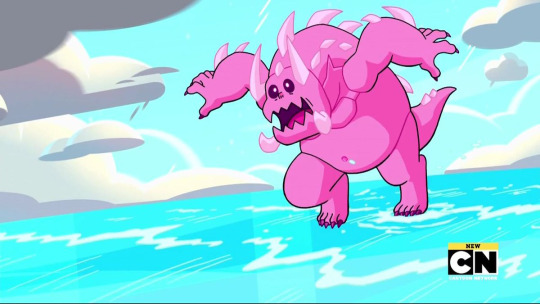
What was Steven even gonna do as a monster? He does nothing to the town, he never even makes it pass the cliffside. He doesn’t even try to attack anybody, the only times he does is when he’s provoked by either the Cluster, the Diamonds, or any of the gems. Spinel raised more hell than Steven. So on the look back it’s insultingly sad they hyped up this big dick energy only to do... genuinely nothing. He already didn’t deserve turning into Pinky the Phallisaurus, but having him not even do anything as a monster left far more to be desired. Mob Psycho 100 did this nearly identical, but better. You can’t deny that it would’ve worked better with 22 minutes, actually give him something to do beyond screech and stomp like he’s Scrat from Ice Age. As much as I don’t like Change Your Mind, 45 minutes worked to its favor to do everything it did. Oh wait, this episode did make good use of time... with a fucking pity party.
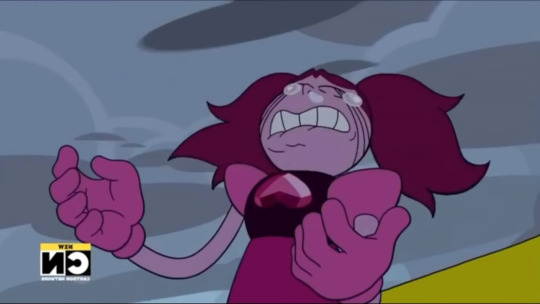
They wasted my baby
This is. The WORST scene in the entire series and I’ll stand by that 100%. It’s one thing to show something offensive, but it’s another to have something be completely pointless. Yes, Connie talked some sense into them, but we didn’t need to waste time having White Diamond and the others bitch about something everyone who isn’t a toesucking simp should’ve figured out at that point. Not like it mattered, the Diamonds and Spinel never show up after this episode anyways, so good job making them count for something, I guess. This as well as minorly acknowledge the fact that the gems had a lot to do with Steven’s mental trauma because hey, we don’t have to hold these gems too accountable for child neglect. Speaking of which, where was Jasp- This plays well into my previous point, we aren’t shown what Steven was gonna do as a monster, so what else is the episode to do beyond holding him back in time to just make the characters go “All is lost” for one second before getting back up like this is Marvel’s Captain Driftwood?
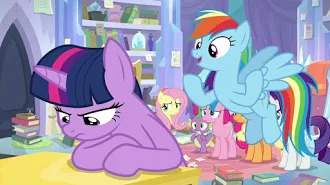
Friendship is Magic had this type of moment in its penultimate finale but in that, more time was given to show the villains getting the upper hand, Twilight at her low point, her turnaround with her friends, and the lead in charge to defeat the villains. While some moments felt convenient and downright insulting, they made the most of their limit. The same can’t be said for this and it makes no sense. Speaking of things that make no sense:
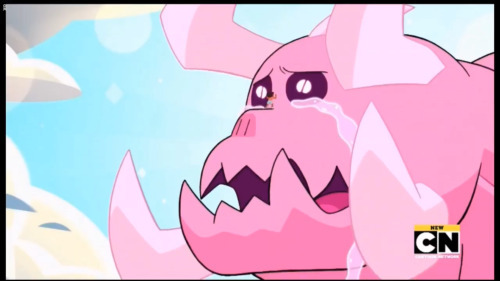
Was this shapeshifting or corruption? Rushing or dragging? This personally bothers me because people are saying he shapeshifted even when they were also on board with him corrupting. But what was the point where monster Steven cums cries into the ocean turning it pink?
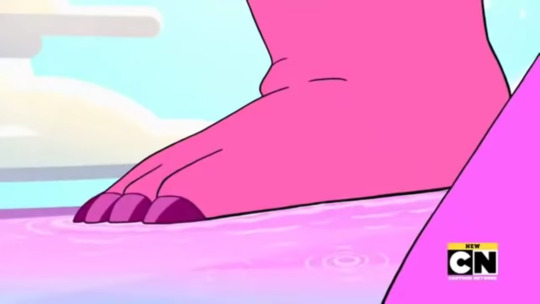
Now if Steven got himself corrupted, this would make sense since the three Diamonds are there with so fully turning him back to normal wouldn’t be an issue. Questions would arise about how corruption can happen to a human, then again this is Steven Universe, fans never really wanted you to ask questions. But if this was shapeshifting, then why have this permanent monster form? It would’ve made a little more sense of Steven changing his shape depending on his emotions, like what we’ve seen before. Additionally, Steven should have been capable of talking normally instead of roaring and growling like he switched brains with an actual animal. Just because he kinned Godzilla’s joystick doesn’t mean he was unable to speak to anybody, that is if he shapeshifted. Lastly, and this is more implicit than my previous points:

This season shouldn’t have tried tacking mental issues and trauma onto this dickslap of a climax. I’m on the side where we should’ve seen more from monster Steven, but what does this tell me for the topic of mental health? Nearly killing people on three separate occasions didn’t help, but having him transform into a near mindless beast is a backhanded way to convey post traumatic stress. Let me put it this way, if we didn’t get that episode where we learn Steven had held up trauma and stress from Doctor Priyanka, everything surrounding it afterward wouldn’t feel as fucked up as it did. Yes, understanding a root of a character’s problems is good, beneficial even, but having your character nearly, sporadically, commit MURDER THREE TIMES only to then have him become a wildin’ creature does nothing, if not disgust. It's disgusting when you talk about PTS one minute and have your main character be socially dangerous the next. You’d feel sorry for him, sure, but I gotta say nearly killing people is not something we should just hand wave. That is not a good or realistic depiction of depression and post traumatic stress; especially when you trying to discuss this with children. And don’t try to justify it by saying it was necessary for his downward spiral. Having to think and see death before my own eyes in real life, there should’ve been a better way to make Steven hit rock bottom without putting other’s lives on the line. It wasn’t compelling or resonating to see him become a witless creature after saying he could get away with anything, it felt jarringly hallow and teeth gritting sadistic to think this was acceptable. It took him turning into a literal creature to finally go to therapy or a throwaway line about therapy in this show’s case? Are you kidding me?

The hug is a nice moment on its own, but it took far too many kneecaps to get to this point and think it’s believably or justly earned. I can make fun of the monster design all I want, but what they put Steven through to get to this point is the most insulting writing I ever have to think about. Because you know what that hug told me, personally? It’s that you can commit near irrefutable atrocities, you can behave like a blithering rampaging beast all you wish, but that won’t matter. Because you’re valid and your people will love you. That is not only asinine, but it kinda pissed on what I went through growing up. Like, as idealistic as that felt, it didn’t add up because it made the mentally unstable come off as more unstable than they mostly are. You can disagree all you want with this, it won’t change the baffling fact that I came to this conclusion in the first place when I didn’t want to. “But the crew said in an interv-” NO, just nope. If the message the show gives is this polarizing for those that invested or were concerned with it, maybe the message wasn’t clear enough, who knows? I can believe Mr. Rogers never fucked this up when he made his show. I tried thinking of this differently, but I can’t excuse what they did and how they did it. Bojack Horseman never pulled this with its main lead and when it truly did, that was given more time to sort out; not an 11 minute epilogue in its final moments. The hug was nice, but this episode was trash.
Speaking of which, next time...

We Finally Look to the Future
Here’s Part 2, if you’re up.
#su critical#su criticism#su critique#su#steven universe#steven universe future#su future#suf#analysis#reviews#Good Stuff#dumb#I am my monster#long post
33 notes
·
View notes
Text
Reading and ranking the entire Den of Shadows series
Check out my other Den of Shadows reviews HERE.
After a year such as this one, I wanted to close it out with something fun so I spent the past month marathoning the entire Den of Shadows series- rereading the original quartet and then reading for the first time the new TDOS books. I was originally going to post reviews/reactions for each book, but that got too cumbersome. Instead, I’m doing one big post of my personal ranking so I can discuss each book and talk about the series as a whole.
Spoilers for the entire Den of Shadows series below.
Personal Ranking
I based it on several different criteria but mainly: 1) How much I enjoyed it, 2) Writing/storytelling quality, 3) If there was anything glaringly ‘problematic’ (which I’ve found is usually a big factor in how much I enjoyed it), 4) How it fits in context of the entire series.
9. Shattered Mirror
It hurts to put this one last on my list because Shattered Mirror was my intro to The Den of Shadows and to ahar’s work. Reading this again as an adult was frustrating because I can see why I loved it the first time around and how most of that doesn’t hold up today. Sarah was a great main character who deserved so much better than the ending she got. It was just wall to wall rape culture and misogyny. I hated Christopher and how he was a creepy pedophilic stalker framed as a romantic hero, I hated how Nikolas got some copout backstory so he would look like a good guy even though he beat a girl to death for rejecting his brother, and I hated how Nissa was enabling both of them. I really hated that this was meant to be a racism/prejudice metaphor because that doesn’t work out when the ‘oppressed’ group does actually harm innocent people. Aside from that, I felt like the pacing was really off- the events unfold over the course of a little over a week and we’re supposed to believe that after hanging out with them twice Sarah’s developed a bond with these vampires strong enough to override the prejudice she’s been raised with since birth (and that Christopher’s in love with her). And then there’s that whole anti-climax when it turns out that the ‘villain’ was Kaleo all along, but instead of having the book end there, there’s another 20 pages where we have to watch Sarah get attacked and changed against her will and then have it framed as a happy ending. I did like that she decided to not stay with Christopher in the end, though.
8. Midnight Predator
I was actually surprised by how much I liked this one because I didn’t remember anything from it at all except for like, two scenes and some character names. It felt more mature in writing style, thematic content, and aesthetics. I also liked that we got a main character who was a little older and that the world was, for the most part, very removed from the human world. It was a good way to close out the original quartet in that it touched on a lot of the themes that had been explored in the books previous. That said, I had a lot of problems with how the issue of slavery was handled and also with how victim-blamey the moral of the story turned out to be. It just didn’t sit right with me that at no point did anyone bring up the idea of, you know, ending slavery at Midnight, which Jaguar had all the power to do. I hate that we were supposed to be sympathetic towards Jaguar and treat him like a good guy because he doesn’t abuse his slaves (for reasons that center on him) like everyone else does when he easily could just...not own slaves. Tying in with the victim blaming stuff, it felt like we were supposed to be satisfied with Turquoise freeing herself but being ok with letting slavery continue. And the big character arc that leads to her getting revenge on Daryl was framed as her ‘not letting herself be a victim anymore’, which is an objectively terrible take on this issue. Aside from that, I also had issues with the pacing here. We were promised a story about Midnight and a mission to assassinate Jeshickah, but all of that goes out the window in an anti-climax about two thirds of the way through the book (and two days into the timeline), and then the rest is a plodding montage leading to a very abrupt end. I also didn’t like how Daryl was supposed to be the real villain of the story but was also portrayed as a snivelling idiot that no one liked anyway, because that lessened the impact of Turquoise finally getting up the courage to kill him.
7. Demon In My View
This was a good followup to ITFOTN in that it struck a balance between being standalone and having ties to the previous book. That said, I found the tone to be surprisingly more immature. I mainly didn’t like how the main character and the antagonist were handled. Jessica, while being a great reader insert/power fantasy, wasn’t very interesting because she didn’t go through any character development or have to sacrifice anything, but still got everything she wanted in the end. Fala was too much of a buttmonkey and her motives were too weak to be taken seriously. It also didn’t sit right with me that she’s the only canonical woc so far and she’s being portrayed as this incompetent cartoon villain even though objectively, like, she does have a point. But I do love the introduction of my favorite underappreciated side character, the ultimate MVP: Caryn Smoke!
6. Token of Darkness
This book had a lot going against it, mainly in that it’s the most disconnected from the other TDOS books in terms of not only characters and setting, but also with introducing beings that hadn’t been mentioned before (in text, at least). I think especially as one of the new TDOS books, it would’ve helped to at least offhandedly namedrop some people/events/places. My second problem with this book was that everything felt very underdeveloped. I loved the new characters that were introduced, but I was disappointed that we didn’t have a lot of time to get to know them. I would’ve liked to see Cooper actually start training under Ryan, I would’ve liked to learn more about the LeCoire family and what it means to be a sorcerer. I also just wanted more Delilah because she’s such a fascinating character (I loved her reckless and unapologetic ambition). Kind of like ITFOTN, I felt like this lacked an Act 2. I think the story should’ve started earlier so we could see more of the investigation part of it, so we can get all the characters together earlier and have them working together (while Delilah has her hidden agenda on the side) to figure this out and build towards that climax. Even with the pacing and development problems, this is higher on the list because I just really enjoyed it- it was light and fun and I hope we get a chance to see these characters again.
5. Poison Tree
This was something that I really wanted out of a new TDOS book- it delved deeper into parts of the world that had been mentioned before- the Bruja Guilds, SingleEarth, the Mistari, and all of that serves to set the scene for Promises to Keep. The concept was this cool deconstructed/reconstructed whodunnit story. It was more complicated than the typical TDOS plot, so I appreciate the ambition. That said, the execution wasn’t great- I often had to pause and go back in order to keep the facts straight and figure out who knows what, which was distracting. Another reason why this didn’t rank higher was that for some reason, I didn’t connect as much with these characters as I have in other books. The pacing was odd, I didn’t like that it came to a point where everyone had figured the main part of the mystery out, but instead of going directly to the climax, it took a detour into relationship drama, which slowed down the momentum. I think it would’ve made more sense to put Sarik and Alysia into a situation where they were forced to work together (rather than that brief but drawn out thing with Sarik and Christian). There would’ve been more tension, conflict, and forward momentum, and because they’re the two leads that were supposed to be focused on, it would’ve felt less like a detour.
4. Persistence of Memory
This was a very good return to TDOS. It feels very familiar in how the new characters fit into the world. It struck a good balance between introducing new characters and having them coexist with concepts and characters that we’ve heard of before. I felt the same spark while reading this as I felt when I first read the original quartet. Like, this entirely new book made me feel nostalgic, and that’s not to be underestimated. I really loved the two protagonists and I was very invested in both of their stories. I particularly loved Shevaun because her struggle with her fear of becoming human again is one that we don’t often see in vampire fiction. I also think both she and Adjila are the perfect embodiment of beings who’ve been around for centuries and just don’t have the same morals and boundaries that humans do. I don’t normally read these books for the romance, but both canon ships here were really well done and believable, and also paralleled each other in an interesting way. And I loved the oddly wholesome focus on found/chosen family. Also, this gets extra points for everyone dunking on Alexander every time he’s mentioned.
I didn’t rank this higher because I wished Erin was more involved in figuring out what was going on with her. I didn’t really like that after a certain point, it felt like Sassy took over as protagonist. Still, I really enjoyed it, the ending was very satisfying (I loved that it was a straight up happy/optimistic ending instead of a bittersweet or abrupt one like most of the TDOS endings had been so far).
3. Promises to Keep
This was a bold ending to the series. It took a lot of guts to basically blow up the world that you spent nearly 20 years creating and I admire that. It was a really engaging story that truly showed the full extent of what ahar was capable of as a writer at that time and the full extent of what a TDOS book could be. I think this time ahar really nailed the pacing (which was something that had always been a bit shaky in the past). We got to spend enough time with Jay and get to know him (it was a good choice to have the protagonist be a character we’ve met before but could still get to know more). I liked seeing everything we’ve learned from all the previous books come together and come into play. And I especially loved that our MVP Caryn got the HEA she deserves. The little epilogues at the end were fun to read (only, I’m mad we didn’t hear anything about Risika. Especially because she does get mentioned (and we finally know that 1) she found out about what happened to her mom, and 2) she and Kaleo have active, ongoing beef over it)). It really felt like a finale, but at the same time, it felt like a new beginning and I can’t wait for new books in this post-Promises world.
This could’ve ranked higher, but I did have a problem with Brina. In terms of personality, etc., I loved her and she was fun to get to know, but I can’t get past the whole slave owner thing and how that aspect of her was handled. I wished that her character arc was more about realizing that enslaving people is objectively bad rather than having her keep pointing out Jay’s incidental hypocrisy as if it weren’t a false equivalence. Her happy ending just felt a little unearned- the only real ‘penance’ she performed wrt being a slave owner was a tacked-on apology during the ritual and a sentence about how she freed her own slaves (again, no mention of whether or not all slavery has ended), and even though she was turned human, it’s not framed as a great or permanent loss, and on top of that she also gets witch powers.
2. In The Forests of the Night
I admit, this ranking is mostly based on nostalgia...but it’s still a very solid book to kick off the series, set the vibes, and introduce us to this world and what kind of series this will be. It’s not the best of the series in terms of writing quality, plot, or scope, but of the original quartet, I think ITFOTN holds up the best. For a YA book of that era, especially one written by someone of its own target demographic, this felt very mature. It wasn’t trying to talk down to its audience and that meant a lot to me. It showed me that YA could be dramatic without being overwrought, serious without being an ‘issues’ book. It tackled questions of identity, morality, faith, power, and freedom, all framed within a fast-paced revenge story. Most of all, Risika is such an interesting, complicated character and her journey was both relatable and entertaining. Of all the endings in this series, the ending of ITFOTN was the most satisfying for me in that the main character had to change and sacrifice, and in the end she got what she truly deserved even if it wasn’t entirely happy. My only complaint is that we don’t see more of Risika throughout the series, especially when there’s clearly more to her story.
1. All Just Glass
The TDOS books are fine as standalones and it’s cool that each one makes it feel like whoever you’re reading about is just a small part of a bigger world, but All Just Glass shows how good it can be when we go deeper into a particular story and give it more time to develop. That said, I don’t think it would’ve been as good as it was if it was written right after Shattered Mirror. There’s a very clear improvement in writing quality and storytelling that can only come from 10 years of experience.
While it didn’t fix all the problems I had with SM (mainly, I would’ve preferred it if Sarah didn’t go back to the Ravenas in the end), AJG made a great choice in shifting to a different, more cohesive theme and illustrating it across a compelling ensemble cast. It cleverly plays on our expectations of the Vida line that were based on the limited scope of SM in order to show that contrary to what we’ve seen previously, this is actually an institution that’s in decline. The Vidas aren’t this great power ruling over the rest of the Macht witches- they’re actually these fundamentalist/extremist outliers who are on the fringes clinging to the ‘old ways’ while everyone else kind of does what they want and their decline is directly related to their obsessive adherence to tradition at all costs. What’s so great about this is that it’s not just a sequel, it’s a subversion of SM that also sets the tone of the new TDOS series in anticipation of the inevitable end.
General Notes
I loved reading these all back to back and watching ahar grow as a writer, watching the world unfold right before my eyes.
It was interesting to see the difference between the two series. I found most of the books in the new series to be generally more engaging because they’re based around a central mystery (What’s the connection between Erin and Shevaun? Who is Samantha? Who attacked SingleEarth? Who’s the shapeshifter?). I also liked that rather than shy away from mentioning technology and trying to pretend that it doesn’t exist or that we’re still in the early 2000s, ahar really leaned into it and in doing so, made the stories feel more realistic.
The original quartet was very aesthetically cohesive, it was a series of vignettes that purely aimed to explore a particular piece of the world. The new series, however, felt cohesive in that each of the books is building towards the end and showing a piece of the puzzle that sets the scene for PtK (PoM gives us more about the Tristes, ToD gives us the elementals, AJG and PT are about groups that are on the decline with their fates based on whether or not they choose to align with the rising power of SingleEarth).
On kind of a petty note, I wanted to mention how much I hate all the new covers (both for the new TDOS series and for the re-release of the original quartet) and I was really disappointed in how low-effort the marketing was for the new series. Even just reading the synopsis for PT and PtK was painful because they seemed slapped together at the last minute like no one cared. I think it was a real missed opportunity to draw in a new audience because they were coming out just as the YA boom, particularly in vampire fiction, was happening.
The biggest takeaway I got from this marathon is a huge respect and appreciation for this extensive world and cast of characters that ahar built (and then had the courage to entirely upend). I know mainstream attention isn’t everything, but I just really hope ahar gets their flowers because this is a great (and highly influential) body of work that’s so different and even ahead of its time.
Anyway, that’s my take on the series. I might make this re-read an annual thing because this was fun. Also, as I was reading, I made sure to note factual info about the world and the characters, so I’ll be making new additions/edits to the reference materials soon.
#Nyeusigrube#amelia atwater rhodes#Den of Shadows#In the Forests of the Night#Demon In My View#Shattered Mirror#Midnight Predator#Persistence of Memory#Token of Darkness#All Just Glass#Poison Tree#Promises to Keep#reviews#digressions
2 notes
·
View notes
Text
Flash stuff, comics and TV
So, I am finally up-to-date on The Flash in both comics and TV format, and I have some thoughts. The comics ones are mostly in the “oh come on are we expected to buy this, clearly you are aiming for that” vein, and the TV show ones are very mild and possible super-obvious, but since both deal with what both what is happening and what I think is going to happen, both might be spoilers so I’m putting them under a cut.
To be clear: please do not tell me anything about these assumptions that does not come from existing text. So for example:
“but in issue 76 we saw X” or “in episode 6 of this season Y happened, so we might get Z fallout” is totally fine. Yay analysis! Would love to hear from you!
“in the comics X happens, so that might mean Y for the TV show” is also cool.
“the comics writer said he’s aiming for X” or “a casting decision has been made so we know Y is still showing up/is not on the show anymore after this point” is really not fine please do not tell me that. I do not want to hear it. Thank you.
Also: discusses possible upcoming character death. I know some people would rather not see that, so mentioning it now.
With that in mind, here are my “I am okay with being wrong about this, but I bet this’ll happen” thoughts:
Comics
Oh, comics. Len has apparently turned into a vicious blowhard, Lisa is picking a fight with him, evil King Cold rules over Central, all is lost, no-one is paying me enough to pick up extra titles from DC to find out what all space and time being broken means, dour, dour, grim.
With that in mind, I have a possibly-more-cheerful read on current Snart events than the one initially presented. I’m going to keep in mind Len’s mention of the Rogues going with Lisa’s plan (issue 78 “Without my sister, the whole plan is on hold.”; issue 79 “This isn’t Lex’s plan. It’s not even my plan. It’s your plan.”), and assume that that was true.
This means that I think (hope) that what they’re going for is a long con. That the Snarts are running with a plan where Len plays bad guy to Central City, Lisa tries to convince Barry to use mega-uncontrollable Speed Force power against Luthor by pitching it as "save my brother he's gone bad", and the end goal is that the world-breaking nonsense and Luthor both get taken down while the Rogues get to keep all the shiny new tech in a world that isn’t weirdly broken by evil.
The big thing that kept throwing me about the narrative presented to Barry is why is Len keeping Barry alive?
Because, look. Right now everyone thinks the Flash is dead (seriously, those guards in the throne room were absolutely thinking “jeez, boss, we’ve heard how the Flash died in your arms three times already this week”), and yeah, that’s good to keep Central hopeless. And Len is coming across as mean as hell. But then why hasn’t he really killed Barry? He’s not angling for the “I will build my reputation with a grand execution!”, because then he wouldn’t be talking up how he’d already killed the Flash. He might be keeping Barry alive just to torment him, but then there’d be no benefit to lying about how he’d killed him. Dude’s stuck in Ice Heights, not even the Trickster* can make a dent in that, it’s not like someone is going to mount a successful rescue.
*Please insert usual where-the-hell-does-he-get-those-wonderful-toys rant here, I’m sure you’ve heard it from me by now.
And if Len was building part of his power on the “I will crush Central City’s spirit by letting them know I have taken down the Flash!” foundation, then Lisa’s “oh no, we can’t let people know you’re alive” seems a bit odd.
So if I take a step back, what I see isn’t “Lisa has a heart of gold and is begging for the Flash’s help.” It’s not even “Lisa is vamping Barry and feeding him a sob story about how her brother has gone bad.”
What I see is “the Snarts have a secret plan that involves no-one knowing that the Flash is still alive, so it doesn’t get back to Lex Luthor. Right now the genius supervillain has a massive blind spot about the existence of a terrifying Speed Force bomb, and Lisa is collecting pieces of Mirror Master’s tech. Those are totally the kind of things you could combine to break Luthor’s secret reality-busting stronghold, which would enable you to get rid of him but still keep your super-cool empowering tech.”
And if Len and Lisa are in cahoots on this, the bombast makes a lot more sense. “My sister has been in hiding ever since I took over Central City... and she reveals herself by stealing from me?" is a performance for the benefit of the two-high level mooks who were following Len and could probably hear him through the open doorway. Giant ice-wolves aren’t anything to do with Lisa being scared of dogs when she was a kid (which didn’t really come across in her reaction to them anyway), they’re just really cool and the speech is Len hamming it up for whoever in his citadel is spying for Luthor.
(I mean. It’s Luthor. You’re working with Lex Luthor, you gotta assume.)
So, yeah. I’m still hoping we’ve got the Snarts running a very sensible long con, which combines the best aspects of “we are crooks who want cool stuff” and “we’re not evil, evil is dumb.” Fingers crossed.
TV
Okay, minor stuff, but I think I’ve finally decoded the symbols on the Monitor’s door!

I was assuming, pretty much, that these referenced the Justice League. The Flash in particular has been throwing in asides to the Justice League since its inception (everyone’s seen the mural at CCPD headquarters, right?), the last crossover involved a building that has people who don’t watch the show assuring me that it’s meant to evoke the Hall of Justice, one of the trailers mentioned seven heroes, here we have seven symbols, etc.
Left to right, I think these represent
Black Lightning - it’s not a logo, but the shape evokes the lightning streaks on the torso of his costume. This one was one I kept getting stuck on - I kept thinking “Trident! ...but it makes no sense for them to bring in Aquaman.” Then I went to catch up on Black Lightning a little and it clicked.
Canary - I honestly was thinking White Canary because I really want to see LOT involved, but Sara doesn’t wear a face mask. Therefore, probably need to go with Black Canary (who is a founding member in at least one version of continuity, lord knows which one, I have trouble keeping track)
Flash - that is, to me, obviously his cowl. Little bit coming down in the middle, little chin covering pointing up, wing-y bits on the ears, we’re good.
Martian Manhunter - this one I’m the least sure of, but given the options available, I think it has to be him. He’s totally a Justice League guy, and the hex with straps pointing up and down to the sides, echoes his costume torso.
Supergirl - again, I was staring at this for a while, completely lost, but now it looks to me like a really stylized ‘S’. If it was narrower on the bottom than on the top, it would look a lot like the family logo.
Batwoman - this is both a scarier-looking mask than the second image, and can be read as a figure spreading their wings to either side. (Huh, I suppose it might be Hawkgirl? But I’m betting on Batwoman. If I’m wrong, that’s okay! I have been wrong before)
Arrow. I mean, really, just Arrow. It’s an arrow-head. Arrow.
And I mean, I don’t necessarily think everyone’s going to survive through this. Oliver Queen in particular I think is going to die. Whether that means Roy or Mia steps up to try and become the Arrow, or whether they leave a seat empty at the table to honour Ollie’s sacrifice, I don’t know. But: Arrow in the JLA of the CW.
But.
Arrow is TV, but in a lot of ways it’s still comics. You know how it happens when people die in comics.
I think we might get to see Ollie as the Spectre.
It fits with the well-meaning darkness and the grim drive. It fits with the judgement of "you have failed this city". It fits with the green hood. The recent “hey, vigilantes working with the police” feel like it gives Ollie a sort of cop-if-you-look-at-him-sideways aura that makes him line up better with Jim Corrigan and Crispus Allen--hell, even Hal Jordan functionally comes across as a space-cop. Even Corrigan’s death thematically echoes Ollie’s first (presumed) death by drowning on the Queen’s Gambit.
I would like that. I have long loved the Spectre, and I would not be where I am as a DC TV fan--hell, as a DC fan--if Arrow hadn’t clicked with me.
I would like it if Oliver Queen, that grumpy control-freak secret-keeping self-righteous ass, could still be there on some level. He means a lot to me.
#commentary#the flash spoilers#dc tv#dc comics#crisis on infinite earths#my commentary#theories#leonard snart#lisa snart#the flash iss. 83#the monitor#justice league#justice league dc tv#oliver queen#the spectre#arrow#here for a positive fandom experience
24 notes
·
View notes
Text
I love the Lab 5 arc, especially Ed’s side of things. It’s like a descent into Hell. Things just get progressively worse and more horrifying the deeper Ed dives into the building, and so many aspects of the plot that were introduced in this first half of the story converge here over the course of these episodes. It begins a little silly and over-the-top, with Ed dodging boobytraps like something out of Indiana Jones, but as more significant events transpire the arc steadily loses its humor, until you’re reacting with the same horror as the characters.

1. The first big discovery: The Slicer is hollow like Al. Condemned prisoners are facing the same fate Ed has subjected his little brother to. This is the second time Ed’s actions as a child are cast in a more sinister light; the first was when Shao Tucker played the “not so different” card, comparing what he did to his wife and Nina with what Ed did to his mother and brother. Like then, Ed and the audience are invited to evaluate the nobility of Ed’s actions, but the focus here is entirely on what Ed did to Al, the act of binding a soul to a hollow suit of armor.
While Ed does express some initial horror upon realizing that the military is torturing prisoners by bonding their souls to suits of armor, he tries to play it off with humor. It’s not until he talks to The Slicer, who is actually two brothers, that Ed realizes how horrific their existence is, and what Ed has done to his own brother is put into painful perspective. These brothers want to die. There is no way to ever get their bodies back, and if there was they’d just be executed for their crimes. They would rather die than keep existing like this.
The only thing Tucker’s first talking chimera (his wife) said was “I want to die” before she gave up living. Nina expressed to Ed that she was in pain too, and Scar confirmed it when he felt her soul entangled with Alexander’s before he put them both out of their misery. The Slicer, like a chimera, is two souls sharing one body, and they’re in pain. But much like when Ed was 12 and Mustang told him (rather brutally) that Nina’s better off gone, Ed can’t get behind a mercy kill.

2. Ed refuses to kill The Slicer brothers. He refuses to take any human life. The only way he could kill them, he says, is if he accepts that they’re not human anymore, but if he does he’d have to admit that Al isn’t human anymore either. This is the first time Ed’s black and white moral code is majorly challenged. He’s 15. He doesn’t understand that sometimes there’s no way around death. He’s forced to confront that maybe killing doesn’t always equal murder.
I feel like after Ed’s encounter with Barry the Chopper when he was 12 that killing for any reason, while already horrifying, became even more unthinkable. That and discovering a couple years later that Barry was right about the State Alchemists, that they have killed people, gruesomely, unfairly...Ed doesn’t want to be like them. And you see, a big source of tension in the show, is Ed’s relationship to the military. Ed has to obey orders, but he doesn’t want to sell his soul to the State.
The Slicer brothers are reminded of their humanity because Ed offers them mercy and kindness, but the gesture only hurts. It’s a reminder of what they’ve lost, everything that was taken away forever, and I think Ed has to consider then that maybe, when he pulled Al’s soul from The Gate and bonded it to armor way back when, maybe that hurt Al more than helped him. Maybe it wasn’t very noble. Maybe it was selfish. Maybe it’s still selfish to keep Al’s soul here, not knowing if there really is a way to get his body back.
Because Ed won’t take a life, the younger brother takes his own life. This sparks a new fear in Ed, that Al will lose the will to live if he can’t get Al’s body back. He vows that he won’t let that happen, which inadvertently raises the stakes for when he has the chance to get Al’s body back at the end of this arc.
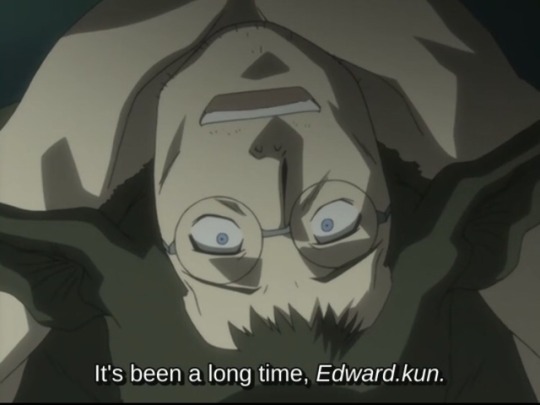
3. Tucker is still alive and trying to recreate Nina. At first seeing Tucker alive and as some grotesque chimera is kind of like WTF WHY, but it actually fits really well. It furthers the parallels between Ed and Tucker: Tucker is trying to rectify his mistake by recreating Nina the way chimeras are made. It’s not the same as human transmutation, but in trying and failing repeatedly to recreate Nina, Tucker has lost more and more parts of his human body. Instead of those parts replaced by steel however, Tucker’s have been replaced with animal parts. He looks more beast than man now.
Tucker tried to use chimera-making to fix a mistake that was caused by him creating chimeras, not unlike how the Elrics want to use human transmutation to fix mistakes that were caused by them using human transmutation before. Tucker has dedicated his life to recreating his daughter, not unlike how Ed has dedicated his life to restoring his brother. But Tucker doesn’t seem to possess the guilt Ed does. He doesn’t express regret; it’s more like an obsessive curiosity, to see if he can seriously recreate his daughter, and Ed’s drawn in a little by this curiosity.
The scientist in him can’t help but wonder if it can be done, which calls back to what Tucker said years ago about how Ed is drawn to try horrific things with alchemy just to see if he can, even more so when Ed’s presented with the incomplete Philosopher’s Stone.
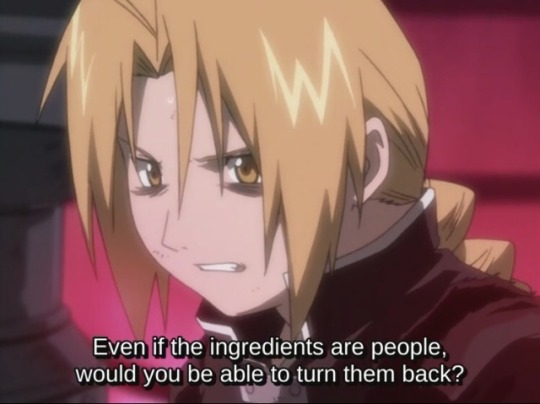
4. Ed is tempted to complete the Philosopher’s Stone. His suspicions about the Stone, that human sacrifices play a part, are more or less confirmed by Tucker, but he’s tricked into thinking those sacrifices have long since already happened. Now, human sacrifice being involved still bothers Ed, but it’s not enough to completely dissuade him, which ties in nicely with Scar, in a different part of the building, sharing his tragic backstory with Al about how his older brother tried to create a Stone from their fallen civilization. It also contrasts what Al starts to tell Scar, that if human sacrifice really is needed that he and Ed will stop pursuing the Stone.
Everything Ed’s worked for is within his grasp and there’s nobody in the room telling him not to go for it. There’s nobody saying it’s wrong. The older Slicer brother feels it would give those past sacrifices meaning. Tucker’s kind of like the devil in Ed’s ear, easing his conscience, stroking his ego. No alchemist has been skilled enough to finish the Stone before, but Ed is. Ed can. Does it really matter if the Stone’s made of dead people? They’re dead already. They’ve been dead a long time. What’s the harm, really, of refining material that’s already here? Of trying? It’s not like Ed killed those people.
Then the prisoners come crashing through the ceiling and it’s made very clear that there isn’t a difference between using dead people or live people; it’s just as immoral. And Tucker throws back his head and laughs wickedly at Ed’s distress because Ed was so close to giving in and accidentally killing all those people. He was even gonna let Tucker use the Stone after him to see if recreating Nina was possible.
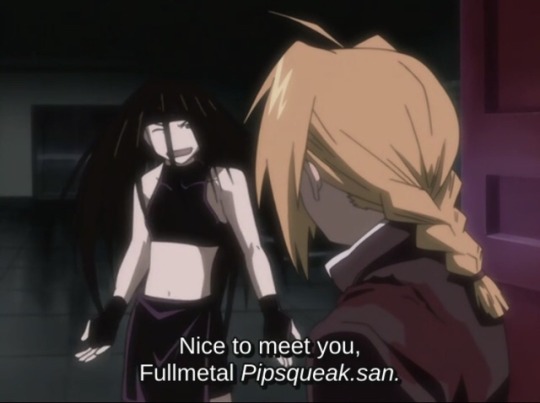
5. Homunculi exist. They’ve been manipulating the Elrics and others who sought the Philosopher’s Stone (Majhal, Cornello, Mugear, Dr. Marcoh) for years, and Ed draws an interesting parallel to the military. He shouts in defiance that he and Al are nobody’s puppets; not the State’s or the homunculi’s. From day 1, Mustang has manipulated Ed. He puts Ed into situations knowing exactly what Ed’s going to do and uses that to further his own career. He (jokingly?) threatens to reveal Al’s secret to get Ed to cooperate, which isn’t that different from how the homunculi use Al against Ed here.
The homunculi have recruited Tucker with the promise of showing him how to recreate Nina. What Tucker’s trying to do is basically make a homunculus out of a chimera. He explains the idea of an artificial soul, which is really just memories and impressions from the creator transplanted into the empty vessel, and Al frets over the legitimacy of his own soul after his confrontation with Barry outside and his struggle to remember things back in Resembool. The possibility of an artificial soul challenges Ed’s definition of human. To Ed, people are human because they have souls, but if a soul’s created does that make it less human? What is a soul anyway? For Ed’s definition to stick, he’d have to admit that a soul is something science can’t explain.
When the homunculi reveal that they only want the Stone to become human, their motivations immediately become sympathetic. A thematic link is established between soul bonds, chimera, and homunculi, the 3 creations Ed’s faced over the course of this arc. They’re all horrifying forms of alchemy. They all involve human experimentation. They’re all ostracized for being different, and they’re all suffering because they exist between human and not. They long to be human, and if they cannot be human they long to die.
Almost everything introduced in the first half of the story comes together here: Tucker, Barry, Scar, the military, the homunculi lurking in the shadows, all of the Elrics’ past brushes with people pursuing the Philosopher’s Stone; it all builds up to this incredible moment.
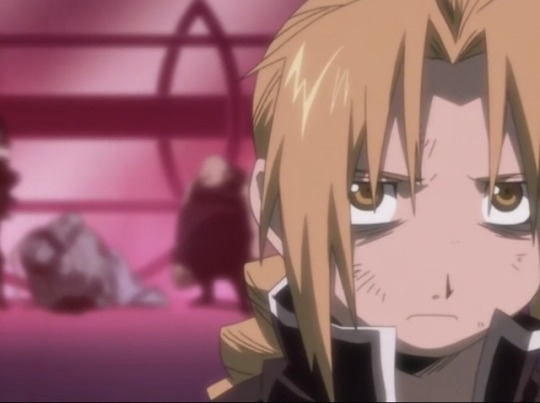
6. Ed nearly creates a Philosopher’s Stone using the prisoners in the room. Neither Ed nor Al can fight their way out of here: Al’s limbs were eaten by Gluttony and Ed’s lost too much blood. His automail’s malfunctioning, and his body’s too weak to put up a real fight. As far as the brothers know, nobody’s coming to the rescue. Al’s pretty much got a knife held against his throat. If Ed doesn’t obey the homunculi, he’s going to lose his little brother.
The homunculi confirm without a doubt that the Stone requires live humans to be made. Ed doesn’t know these prisoners. He doesn’t care about them. Later on, he’ll even admit that their lives really meant nothing to him next to Al. It’s a test of his greed and empathy. Ed’s more empathetic than he was at the start of the story, but it’s still not his strong suit. Using dead people, strangers he didn’t know anything about, didn’t faze him much earlier. Using live people is wrong. Ed knows it is, but.....as Ed also admits later, if Al wasn’t right there watching him, he could, maybe, push his conscience aside and sacrifice those prisoners.
Even though Al doesn’t want him to. Even though Al tells him that he doesn’t want his body back if it means other people have to die. It doesn’t really matter what Al wants here. Ed’s thinking selfishly, driven by trauma that altered the course of his entire life. He wants to get Al’s body back. He wants to give Al his life back because he loves his brother and he wants this horrible guilt to go away. Al is the only family he has left, the only friend he hasn’t pushed away. He doesn’t want to lose him. He can’t.
This is Edward’s lowest point thus far, and it’s written all over his face. Lab 5 has beaten him down, physically and emotionally. He’s nearly surrendered to despair, apathy, and his own desires. But ultimately Ed can’t do it, and Scar, watching Ed prove he’s better than his older brother was, decides to intervene and help Ed and Al escape.
It’s just a brilliant couple of episodes. You can see the farther Ed tumbles down the rabbit hole, the denser and darker things grow, and the more things come together. So many ethical and philosophical questions are raised. So much is set up for the second half of the story. Ed and Al make it through the hell of Lab 5 to the other side, but they emerge close to death and changed forever and it’s [clenches fist] so good.
#fma#fma 2003#fma 03#i have a lot of Thoughts#this might not even be all of them#ed#this arc's a wild ride but its a really smart wild ride and a big reason i love this series
275 notes
·
View notes
Text
does it almost feel like you’ve been here before?
For @whumptober2019 day 2: explosion. Content warning for a lot of fire, very bad burns, and general description of of major city-destroying disasters.
Posted late because I went to a Bastille concert last night and it was amaaaazing but it was also very late when I got home! (look don’t @ me about the title it’s VERY THEMATICALLY RELEVANT.)
This is about an OC (Vehuel, Principality of Chicago... and several other cities in the past.)
Everything had been on fire for quite some time, and Vehuel was comfortable with that.
Well, no. She wasn't. That would be a lie. She was resigned to that, but if she was honest with herself she was desperately uncomfortable, sweaty and sooty and bone-tired.
Currently she was dragging a man out of a haberdashery. Vehuel wasn't sure if it was his shop or someone else's, but idiots had been trying to save things instead of their own skins all night, so of course, of course it fell to her to
rush into the flames and drag him to safety. Heaven had been very specific about this one; something about founding a city. As if they didn't have plenty of decent cities already, she thought. Maybe if they could stop blowing some of them up they wouldn't need to have humans build new ones.
"This better be a really good city," she muttered under her breath, slinging Aeneas over her shoulder. He was unconscious this time, which was good; the last few times she'd dragged Aeneas away from certain death he'd been inconveniently awake and very annoying. On the other hand, the longer he was unconscious the more likely he was to die, and she wondered if maybe she should try and wake him up, only not now, not in the middle of the street. The city was burning around her and there were Acheans goddamn everywhere, and she had to keep moving.
Aeneas moaned.
"I guess we're doing this now, then," she muttered, and
put him down in the middle of the street, sparing a miracle to keep him from losing his balance as he regained consciousness.
The man's eyes opened and he stared at her. "What? Who are --"
"Leave," she snapped. "Run! Now. Don't even remember me!" He stumbled out of the building and into the throng of people rushing north.
The building burst into flames as soon as they were out, and the shop windows exploded outward, flames licking through them and up the sides of the building.
They'd been nice hats, Vehuel had to admit, but no hat was that nice. Humans had stupid priorities, sometimes.
She hurried northward, pausing for a moment to watch work at the Field & Letier building with interest. As before, Vehuel couldn't imagine any dry goods could be worth more than lives, but she couldn't drag all of these people away, and it was a beautiful marble building. It would be a pity if it went up in flames. Unlike the little haberdashery, the store surely had firehoses inside; maybe they could save it. She did a quick blessing -- If it goes up in flames, everyone will get out all right, she told reality firmly -- and left them to their work.
The press of the crowd made the stifling heat even worse, and she'd had to save a few people from being trampled while mentally cursing out whoever's idea it had been to build the streets and sidewalks out of wood, honestly, what idiot had done that? She would have to talk to the -- the -- whoever was in charge of that nonsense. Elders? No. Aldermen. Yeah.
Assuming they survived, of course.
The bridge was made of wood, too, because of course it was. They might destroy it to stop the fire from jumping the river again, but she decided to stand watch here and make sure anyone who tried to cross could do so before that happened, and maybe keep it unburnt for as long as possible. But the wind was going to be a problem; it had been the main problem in San Francisco -- San Francisco, had Heaven even reassigned that one yet? Why was it always her cities going up in smoke? Two cities in twenty years was a record even for her, though.
In a crowded place like this she normally wouldn't have opened her wings, but people kept pausing to stare at the flames roaring through the city behind them, so it was easy enough to slip into the sky, unnoticed, and circle over the bridge. She watched the crowd for an hour or so, trying to instill in them a sense of community and responsibility to their fellow humans. It almost worked; she didn't see any pickpockets, although there were a few opportunistic people trying to seize things other people had dropped. They nearly got trampled for their troubles, but Vehuel kept them out of trouble.
A terrible clanging noise nearly made her fall out of the sky, and she saw that the courthouse had collapsed. That had been the bell. She flew closer, sparks streaking across her skin, and spared another miracle to keep the flames from engulfing the prisoners as they fled the ruined courthouse.
She looked back northward. The wind was picking up again, and the rising air was carrying her too far above the city to see much, so she dove back down to soar over the north side of the river, hoping she could keep the wind from carrying the fire over. It had already leapt over the river once; she'd be damned if she would let it happen again.
Well. No. She'd be reassigned, probably. Heaven had always been merciful to her despite her many mistakes.
She pushed sparks and flaming debris southward with wingbeats when she saw them. There were little flames along the surface of the river now, and several barges were on fire. The throng fleeing across the bridge was pushing and shoving as the fire raged on the southern bank of the river.
She landed next to the railroad tracks on the northern bank, needing to take a moment and recover her strength. It was too much, too much to keep people from being crushed on the bridge and hover in the air and notice all the sparks and keep them away and oh, she just wanted to go back to hanging around in saloons with good music and better beer, smoothing over barfights and cleaning card hustlers out of their hard-swindled money.
But as she was thinking this, something niggled at the back of her mind, and she noticed a scrap of something aflame floating on the breeze towards a tank car, and she reached for it with a miracle, to extinguish it, to transform the liquid inside to water, to -- to -- anything, really -- but she was too slow, and the flame landed on the train car.
"Oh come on, that's
not fair, you can't just -- you can't just take my miracles away!" he shouted at the skies, and immediately regretted it, because, well. Of course they could.
Vehuel looked around for anyone he could save, anything he could do now, his plan shattered by the complete and utter indifference of Heaven to the plight of a vacation town known for its baths and brothels. It wasn't a good city, but it was beautiful in its way; it was human.
Just then, a little scroll floated down from the sky, which was much more welcome than the rain of ash and pumice they'd been having. He ripped it open, and read, hoping it was the answer to his prayers.
It was not. It was the answer to a question he'd asked nearly a week ago, when he'd suspected Vesuvius was going to erupt and wanted to know if there was anyone Heaven wanted to keep alive. He'd learned his lesson from Aeneas; much easier to save somebody by dragging him out of the city well before it was aflame.
The note simply read:
Whole town expendable.
Fine. Fine, that was fine, then. He would just -- he would just have to deal with it. He'd get a new body, at least; he didn't much like this one, it couldn't handle solar radiation nearly as well as the last one. He unfurled his wings and braced them against the rolling cloud of acid and heat he knew was coming.
Not that they would help. It was just instinct.
And suddenly his feathers were aflame and his flesh was melting off, and oh, he couldn't breathe for coughing, everything was
pain and fire and she was lying flat on her back and the ground was hot.
"Come on, get up," said somebody, and pulled her to her feet, only her eyes were watering and she was coughing up maybe both her lungs at once? "Calm down, Vehuel, you don't need to breathe," said the voice, not unkindly but still impatiently.
She did that. "Oh. Oh, ow." One of her wings was still on fire, and she shook it out. She wouldn't be flying for a while. She looked at her rescuer. "Michael!" she said, and then she couldn't think of anything more to say, because! Michael!
All around them, the world was on fire. "A beam of wood just fell on the waterworks," said Michael, "so the fire department will be useless."
"They're already useless," grumbled Vehuel. "Why are you here?" She could dare to hope, if Michael was here. Michael actually took her seriously, which was itself a little terrifying, because Vehuel knew she didn't merit that, but it meant she would help, and at this point Vehuel would've taken help from anyone except maybe Satan.
"I have a church protected with miracles on North Avenue and Church Street," said Michael, "but this is -- this is, frankly, an extraordinary fire, worse than I'd expected. It's far north but I don't know if the fire will peter out before it gets there. You try to get people there and I'll try and keep them safe when they get there. Understood?"
Vehuel nodded numbly. "But why are you here?" she blurted out.
Michael ignored her, and took off. Vehuel watched her go, then took a deep, non-coughing breath to steady herself, and waded back into the flames.
#whumptober2019#no.2#good omens#michael good omens#kaesa op#my ocs#text#fiction#tw: fire#tw: burns#tw: major disasters#this is very self-indulgent and I am happy with that
5 notes
·
View notes
Note
The Empty says he'll come for Cas when he's happy and I've been thinking that meant he had a heart to heart with Dean but isn't it more likely that his acceptance of his previous decisions will be what summons the Empty? He feels so much guilt for Heaven and the fall, etc. But he saw the AU and what would have happened if he'd not made his own choices. And we saw how terrified of heaven he is now, that he knows they're all shades of evil. So, maybe self forgiveness is the trigger and not Dean?
eep I have not had enough coffee for this yet… :P
Let’s start with the assumption that Cas is a multidimensional character with issues on a lot of fronts. Dean is not his sole reason for being, and not his sole emotional issue, you know?
That said, he knows the current situation in Heaven. Not only that, he knows that while he’s played a part in Heaven’s earlier problems, he’s been working harder than all the other angels put together trying to fix what’s wrong there– both as a result of his (and other angels’) actions in the past (because remember the whole apocalypse thing was NOT his idea and he has PROOF from GOD that he’s the one who kept trying to do the right thing… by the sheer fact that he was the one repeatedly resurrected, you know?) as well as now.
He’s consistently done everything in his own power to help Heaven, and aside from that one time he’d been partially taken over by the Leviathan and killed swaths of angels in “punishment” as Godstiel and that other time he was lied to and tricked into helping Metatron complete the angel fall spell (because he fully believed it would lock all the angels IN Heaven, not dump them out), Heaven’s problems really aren’t his fault, you know? There’s only so many times one angel can plead to all the others to let the past go, to accept that the world has changed, and that they either need to change with it or die…
Since then he has gone so far out of his way to try to make amends that it’s beyond ridiculous. I mean, I was just watching 11.02 a few hours ago, and even the angel who is probably Cas’s last “friend” in Heaven– Hannah– has played a part in Cas’s torture and manipulation. Cas had asked for help, and was the one angel who had a decent idea of the gravity of the situation with the Darkness, and yet even Hannah was ready to punish him in order to get Sam and Dean’s location out of him. NOT to talk with them and discover what had happened, but to punish and kill them for what they’d done.
There is no reasoning with angels. Cas had accepted that. The next time he asked for Heaven’s help (in 11.22), it was as a direct messenger of God, and he still had to beg, even when he had the authority of God behind him. So what did he really expect from Heaven? When Heaven approached HIM in 12.15, it was under the assumption that he would “repent” for what he’d done and return to them, and abandon his nonsense on Earth and with the Winchesters. But he firmly declared that no, he was doing all of this for the Winchesters. It was Heaven’s insistence they handle Dagon and Kelly their way that led to even more angel deaths.
Then they continued the same sort of campaign in s13– first attempting to kill Jack and then not letting anything stand in their way to capturing Jack to use his powers to “fix” Heaven. Dumah tried to ask for Cas’s help in “convincing” Jack to essentially be their magical little slave, but the truth was that the angels selfishly wanted to use Jack like some sort of battery, and not like a person. Which is honestly horrific.
I think that meeting his alternate version in the AU was more about understanding the differences between what he COULD have been versus what he IS. I don’t think it’s a matter of him realizing that Heaven is “evil” or corrupt or just flat-out wrong. Those were things he already knew. It was more about him being able to take his destiny into his own hands quite literally. Killing his AU self who’d been brainwashed and damaged beyond all recognition, precisely because he was never forced to consider free will, isn’t just about Dean having been the one to keep that door open for him, you know? Yes, the entire process never would’ve begun without Dean, but on every other level that mattered, the choices and actions came down to what Castiel chose for himself. Killing his AU self was entirely about him. They were even alone in that scene, you know? That was about Cas himself facing this. Not about proving Heaven was evil, or would torture him into compliance, or even about the fact that Dean had essentially saved him from that fate. It was about HIM, and what breaking free of Heaven’s control had finally allowed him to become. Which seems like a subtle difference, because yes Dean has been the catalyst (repeatedly, over the last ten years, opening the door in the first place and then continuing to support him to the point where he’s irrevocably become A Winchester himself in every way that matters, through trials and hard times as well as through successes), but the important thing to remember is that Cas could’ve chosen a different path at any point (like he did in s6), and yet over and over he continued to choose free will, even when he wasn’t sure it was the right thing, and even when he didn’t get it quite right. Reducing all of that to be “because Dean” is kinda reductive.
Obviously this summary here is seriously glossing over a lot. This is in no way everything that’s happened here, but just a quick lil refresher leading up to what I’m about to say… which is:
Cas has been making his peace with Heaven, and with himself, for a really long time. He’s even (shockingly) been given a sort of absolution from Naomi of all people, back in 13.19 when she walked him to the door and let him go. Then in 14.08 she acknowledged that Cas’s motives may not have been putting Heaven first in taking the actions he did to save them from the Empty Entity, which in itself is a sort of forgiveness or acceptance of who Cas is, and she also specifically THANKED him.
Naomi, at least (and probably Dumah) are now beginning to understand Cas and the fact he hasn’t been “working against Heaven” all this time, but searching for a better way, balancing the needs and wants of Heaven with the needs and wants of humanity on Earth. Because it’s never been “us or them,” as SO many angels have been convinced of over the years. This is not a black and white issue, on any level.
So when it comes to what could make Cas perfectly happy, what would trigger his deal with the empty, I think it must first and foremost be about Cas himself.
Even having Heaven’s forgiveness and acceptance wasn’t enough to trigger the deal. Even saving Jack wasn’t enough. Even reunited with the Winchesters as a family wasn’t enough. Because while I feel that yes, Dean will of course play a major part in Cas achieving that happiness, because Dean has ALWAYS been the major trigger for ALL of Cas’s growth over the years, it wouldn’t be as simplistic as some romantic declaration, you know? Because Cas as a character is so much more than that.
But since you asked me what I thought of this, I’m gonna tell you.
I’m not entirely sure it will ever come to this. I’m not sure they won’t find some other resolution to Cas’s deal before it comes to them laying out Cas’s happiness trigger on the table that blatantly, you know?
Not to mention, this is the sort of speculation I personally hate, because it’s based on the assumption that we’re looking at this from the right direction. And we literally have no way to know if we’re somehow obsessing over the entirely wrong thing, or interpreting it correctly.
Right now, this entire question and response is grounded on unstable foundations. It’s nothing more than a theoretical exercise, because we have no way to know what will actually be important by the end of the season. I can suggest that thematically and from a character perspective this will come down to Cas’s choices and his own opinion of himself, and that Dean will likely play a role as a catalyst in making his choice. But outside of that… I’m not even sure if the rest of this will ever actually be relevant in the first place. Because we’ve made the ASSUMPTION that we’re correct in believing this must come down to some sort of confrontation between Cas and the Empty, or that we will definitively have a singular moment of Absolute Happiness with unqualified certitude that it was One Singular Thing that sparked Cas’s doom. And that’s just… not how this works. At least not from the speculation side of things.
I mean, this is an interesting question from a purely theoretical standpoint, because it was interesting enough to me to spend the last two hours typing this nonsense up. But outside of this reply having been an interesting thought exercise for me, I don’t think there’s really any conclusion to be made. I think the question is unanswerable, because we don’t even know yet if canon will bear it out as a valid question in the first place, you know?
I really hope that makes sense. It’s just frustrating to me that there’s even this hemming and hawing over speculation like this, as if it has to be Destiel or Not-Destiel, and those are the only two valid assumptions going forward. Because that assumption negates all of this ^^, that yes of course it is all about Cas and his choices and being able to forgive himself and hopefully understand himself enough to make those choices about who and what he wants to be, but you literally cannot divorce Dean’s presence in Cas’s life and his influence in every one of Cas’s choices over the last almost 11 years from what Cas inevitably will choose for himself.
I’m not saying that Cas will choose xyz thing because of Dean’s influence (hur hur), or because Dean pushed him into choosing it. Cas’s story arc is still primarily about HIM, just like Dean’s is primarily about Dean, and Sam’s is primarily about Sam. That’s how main characters function in a narrative, you know? But they also don’t function in a vacuum. What makes up the narrative is how each of the characters relate to the others, and how all of their choices are influenced by and consequently affect the others.
So at the very root, I think the question is looking to establish some false duality that it must be one or the other thing, that one of these things will be The Truth™ and will therefore negate or invalidate the other. And that’s just… not how this works. I think that really does a disservice to Castiel as a character, reducing him to a plot device when this has literally been his character arc since s4, made essential to the ongoing narrative structure since at least s8
#castiel winchester#you learned it from the goats#destiel#the scheherazade of supernatural#spn s14 speculation#spn 14.08#spn 13.19#spn 12.15#spn 12.19#spn 11.22#spn 11.02#spn 13.07#spn 13.22#we don't talk about season six#heck what else do I need to tag this D:#i mean note that i have separate tags for Cas's evolution and destiel because they may be separate specific things#despite being very closely linked but cas will always be The Most Crucial Factor in his own development#because that's how main characters work in fiction#otherwise they're plot devices or narrative mirrors or background characters#sorry this reply is a disaster :P#whendoestheshipsail#spn duality#spn morality#adding those tags for the reminder that trying to force things into Black/White or Good/Bad either or options is a logical fallacy#and trying to speculate on logical fallacies is an interesting thought exercise at best
35 notes
·
View notes
Text
The Ranking of Final Fantasy: Final Fantasy II
After the runaway success of Final Fantasy, Square wanted to capitalise on it and release a sequel as soon as they could. As such, Final Fantasy II was made a mere year later for the NES for Japan only. What made this sequel special is in how little it actually resembles its predecessor. Instead of taking the easy route, Square decided to change how the combat system worked, worked in a more elaborate story with more in the way of characters, and crafted a whole new world. Very impressive work considering the single year gap. Some assets were understandably re-used (such as character sprites being close to identical to FFI) but there was a fair amount of original designs too. Of course, none of this came without a price...
All of the above sounds pretty good on paper, right? Well, I'll start with the combat system. More specifically, the leveling system. Experience as a leveling up system is gone, and in its place is a system that levels up stats and abilities with their use. So, as an example, you level up your sword skill by using swords in battle, and you level up your intelligence or MP by casting magic (magic costs points to use now rather than the charge system in the last game, which is an improvement in my eyes). Again, on paper this sounds pretty good and logical! However the amount of time it takes to level up these skills to a high degree is insane, requiring literally thousands of casts to reach anywhere close to top level magic, and each spell has to level up individually. This means if you want to cast high level elemental magic for the 3 major elements (fire, ice, lightning) then you'd have to cast each about 3,000 times. The same issue applies to the weapons too, which means that despite there being a whole host of different weapon types, you are at a complete disadvantage if you level anything other than swords, bows, or axes as most of the types have little to no late game tier weapons. This is probably why the encounter rate in this game is so high. It's far higher that FFI from what I can tell, or at least it feels significantly higher. The constant battles make the game feel like a chore to get through, draining you of your resources in game and patience out.
Another flaw with this system is that to be able to increase your maximum HP or MP then you have to take damage or use MP in battle and finish the fight. This leads to a problem with the way the game calculates the damage taken. If one of your characters takes damage in battle but you heal it up during the fight, it'll negate the damage taken and not count for the trigger to increase maximum HP. The way this is all calculated means that a common 'power levelling' tactic is to fight the weakest enemies in the game, beat the ever loving crap out of yourselves for as long as you can, then finish the fight, resulting in massive stat increases. This easy work around means that the game can become trivialised pretty easily. It also makes the game in general very unsatisfying to play as the game is either way too hard or way too easy due to a lack of balancing and huge difficulty spikes for the unprepared. Instead the gameplay is an exercise in tedium rather than being enjoyable like the first game due to level ups not feeling as good as they did in FFI nor the exploration aspect of the game being very enjoyable either.
The exploration aspect of the game is the same as the first game: world map, towns, dungeons. The world map aspect is pretty standard and follows in the same vein as the first with the same sort of transportation options open to the player. I only have a couple of issues with it to be honest, both of which are relatively minor. Firstly it's deceptively small, which means that the game requires you to back track through a lot of it with quests sending you back and forth across the same parts of the world and getting you back to a home base of sorts. Not a massive issue as it is not a bad thing, thematically, to return to the base of the resistance between missions. This does slow the pacing of the game right down though. Secondly, the map has an issue with signposting difficult enemies. For example in the last game, as the map was significantly larger, harder enemies were gated in to zones you could only get to with the use of a vehicle or tool locked behind a dungeon or boss. Not the case here. It's very easy early on in the game to wander just a little bit to too far to the West and get one-shot by enemies meant to be fought a lot later in the game. It does give the world a more hostile feeling but it's not exactly fair either. The towns that litter the world map are fine, nothing too interesting of note as they all are pretty similar, although I do like how they change throughout the game at times, such as Fynn being re-occupied by normal citizens when you liberate it from the empire and Altair showing signs of damage after it's attacked. Helping exploration a bit is the key word system which lets you learn and ask key words to certain NPCs. It is somewhat limited in scope however and isn't utilised as well as it could have, but this was a NES game after all so I wouldn't have expected anything too amazing. The fact it is in this game at all and utilised how it is is impressive in itself, honestly.
The dungeons are a different story though, and is part of the major failing of this game. You'll spend the vast majority of the play time crawling through these dungeons which take a few different shapes but are mostly caves and stone fortresses. The tile sets look fine but the way that the dungeons themselves are designed is among the worst I've ever played. They're so tedious. Not only are they complex to a fault, having many twisting paths and dead ends that provide little to no reward, but they seem to be designed to create as much ire in the player as possible. Throughout all the dungeons there are doors, either in corners or at the end of a corridor with a few of them in a row, but unfortunately these doors more than often lead to empty rooms which drop you in to the middle of them. Not only is it annoying that there's nothing in the rooms (especially when you choose the wrong door out of several next to each other, only one of which progresses the dungeon), the encounter rate in these rooms is tweaked incredibly high. This means that it is more than possible to encounter enemies with every step you take back to the door which can be lethal if you're in the wrong situation or get a bad mix of enemies. Not helping the dungeons is the boring music, which certainly doesn't negate the tedium.
The music in general is rather lackluster to be honest. The only music pieces I can think of that are good are the normal battle theme, the over world theme, and the rebel theme that plays when you're in the rebel base. Everything else is really boring, or repetitive, or just bizarre like the boss theme. Seriously, what is up with that boss theme?(https://www.youtube.com/watch?v=fprhlzyl30s) The one used for later game bosses is better but still not incredible or very memorable. Honestly that's a word that can sum up the majority of the soundtrack despite how repetitive it is: forgettable. This is where the Chocobos are introduced for the first time, but they somehow ruin that through the music which is literally just one bar long and is repeated ad nauseam, and I don't think I need to explain why that is so terrible...
The story of the game ranges from boring to 'okay'. Characters are more than mere cardboard cut-outs like in FFI but they still aren't amazingly fleshed out. There isn't much in the way of character development for the main characters, despite them being distinct characters this time around. You never really learn much about Firion, Guy, or Maria during the whole game other than they're orphans and really don't like the empire because they destroyed their home. This is a shame as they are obviously with the party the whole game and just get nothing to say really. The supporting characters aren't too much better either. Through the game you get extra party members that take up the fourth slot in your party, however you'll quickly learn that this is sometimes just a death sentence for them, or you'll learn just to simply not care about them at all. Often times the party member will come in weak and underpowered, meaning you have to baby sit them as they gain levels, only for them to leave the party forever (taking all equipment with them) or they die to save the three protagonists in a dramatic moment. While it does provide a context for the fight and shows how desperate the war on the empire is, but it's also dramatically repetitive. Of course this is a really good story for a NES game and has far more complexities than anything else at the time. But now the story is mostly just not engaging. The story is mostly predictable, characters are mostly one note, the big bad, the Emperor, is pretty flat and starts the trend of Final Fantasy antagonists either being only one part of a bigger unseen picture, or coming back from the dead because 'evil magic'. Honestly I don't think there's a single memorable character here, and there isn't much I could tell you about the ones I do remember, aside from Minwu looks cool and unique? The story starts surprisingly strong though, with an unwinnable fight to wipe the party in order to set the tone and the pace of the story is pretty snappy too, setting you off in to the world and making decent progress with exposing or routing the empire from towns and even destroying their Dreadnought ship. Unfortunately the story's pace just nose dives after that, padding the story out with a world spanning fetch quest where the story just treads water until the end with boring long dungeons and an ending which is rather flat.
In conclusion, Final Fantasy II isn't very good. It's boring, frustrating, repetitive, tedious, but also has a couple of bright spots in the premise and the idea of the levelling up system. I played through this game on the PSP/ mobile version which is far less frustrating than the original or PS1 version. In the original game on NES, the frustrating stat increase system was even more annoying with a stat degradation that would take away points from skills or stats that weren't used for a while. I think that would have made me quit the game pretty early on to be quite honest. The original also only ever let you save your game outside, and with the length of some of these dungeons combined with the high encounter rate would also lead to an ungodly amount of stress and frustration.
So how does this game compare to the rest of the series so far? Well comparing the game to FFI alone, this is a night and day difference. You can tell this game was made quickly as the developers seemed to have forgot to make the gameplay fun before they focused on telling a more complex tale within a video game. Not only is this a bad Final Fantasy, it's a bad RPG, and is the black sheep of the series for a reason. Obviously this is going to the bottom of the list, where I predict it will stay for the rest of this series.
And that's it for Final Fantasy II! I won't lie, I'm glad to see the back of it. It's part of why I took so long getting this done, I lost a lot of motivation to get through the game due to some of the rubbish the game threw my way. It's only up from here though! Just for the record too, I plan to do all direct sequels in this series too, which means I'll be reviewing and rating Final Fantasies IV: The After Years, X-2, XIII-2, and XIII: Lightning Returns. The only one I probably won't touch is XII: Revenant Wings due to me mostly just being uninterested in it. Anyway, thank you for reading, and please look forward to when I review and rate Final Fantasy III!
Current Rankings:
Final Fantasy
Final Fantasy II
#Final Fantasy 2#Review#Retro#Retorspective#Final Fantasy II#Opinion#Final Fantasy Series#Ranking#NES
8 notes
·
View notes
Text
Cyberpunk 2077 Review Roundup
https://ift.tt/eA8V8J
Cyberpunk 2077 is arguably the most highly-anticipated game of 2020, and after several delays and other controversies, it’s finally here. Fans will be able to get their hands on CD Projekt Red’s new RPG on Dec. 10 (unless you pre-ordered from Best Buy). Ahead of the global launch, here’s what critics are saying about the game so far:
Andrew Reiner, Game Informer:
“Cyberpunk 2077 is a work of awe-inspiring ambition, dazzling with its massive scale and creative vision. The world of Night City is a metropolis of futuristic art, stealing your eye with stunning neon-lit architecture and streets filled with citizens made of flesh and metal. Night City is an open world that immediately pulls you in and keeps you engaged with its dark narrative, meaningful player choice, and overwhelming amount of side content.”
Score: 9/10
Kallie Plagge, Gamespot:
“It also bears a mention: Cyberpunk 2077 is phenomenally buggy. I played a pre-release build that was updated during the review period, and there’s a day-one patch planned as well, but the scale of technical issues is too large to reasonably expect immediate fixes. I encountered some kind of bug on every mission I went on, from more common, funnier ones like characters randomly T-posing to several complete crashes. I didn’t notice much of an improvement after the update, either. In a very late-game, very important fight, the game froze on me–twice. I ended up taking a break out of frustration before attempting, and finally succeeding, the third time.
These bugs, more than any game I’ve played in years, took me out of the experience often. Non-interactable items like cardboard boxes will explode when you interact with something next to them; UI elements will stay on-screen long after they’re meant to, which is only solved by reloading a save; characters will interrupt themselves during proper dialogue sequences by repeating a throwaway line they’d say in the overworld, seriously disrupting key moments; I died once and, upon reloading my last save, found my hacking ability no longer worked, forcing me to roll back to an autosave 10 minutes prior. The list is extensive.
Score: 7/10
James Davenport, PC Gamer:
“I found it moving and life-affirming in the final moments, even in the face of near certain death and a relentless onslaught of bugs. I suppose it’s an appropriate thematic throughline though: Cyberpunk 2077 is a game about V coming apart at the seams, in a city coming apart at the seams, in a game coming apart at the seams. Play it in a few months.”
Score: 78/100
Tom Marks, IGN:
“Cyberpunk 2077 kicks you into its beautiful and dazzlingly dense cityscape with few restrictions. It offers a staggering amount of choice in how to build your character, approach quests, and confront enemies, and your decisions can have a tangible and natural-feeling impact on both the world around you and the stories of the people who inhabit it. Those stories can be emotional, funny, dark, exciting, and sometimes all of those things at once. The main quest may be shorter than expected when taken on its own and it’s not always clear what you need to do to make meaningful changes to its finale, but the multitude of side quests available almost from the start can have a surprisingly powerful effect on the options you have when you get there. It’s a shame that frustratingly frequent bugs can occasionally kill an otherwise well-set mood, but Cyberpunk 2077’s impressively flexible design makes it a truly remarkable RPG.”
Score: 9/10
James Billcliffe, VG24/7:
“In the midst of such intense anticipation and scrutiny, it’s easy to get carried away with what Cyberpunk 2077 could have been. The final experience might be more familiar than many predicted, with plenty of elements that aren’t perfect, but it’s dripping with detail and engaging stories. With so much to see and do, Cyberpunk 2077 is the kind of RPG where you blink and hours go by, which is just what we need to finish off 2020.”
Score: 5/5
Carolyn Petit, Polygon:
“One of my fears about Cyberpunk 2077 was that it was going to be so cynical and nihilistic that playing it would be like wallowing in grim hopelessness, that the cheapness of human life in the game’s world would be mirrored by the game itself. But that’s not the case. It’s easy to lose the human thread in the overwhelming glut of stuff Cyberpunk 2077 puts on your plate, with your map plastered with crimes you can violently “neutralize” for a reward from the police, and fixers constantly sending you text messages about underdeveloped one-off jobs you can take on to earn a bit of extra cash. But the humanity is there, if you look for it.
“And that humanity is the saving grace of this alluring yet uneven and deeply flawed game. I can’t deny that Night City wowed me with its scale, its verticality, and its sense of history. But I wish I could see people like me on its streets as something more than objects. I wish that the game’s politics were more radical. Yes, I know I shouldn’t look to a colossal game that was itself produced under exploitative labor conditions to lead the charge of anticapitalist liberation, but I wish the sparks of Johnny Silverhand’s ideological rage got to burn brighter, that Cyberpunk 2077 felt more interested in envisioning new futures than in reminiscing over bygone glories. Neither its gameplay nor its narrative can imagine the bold possibilities that I find so central to the best of cyberpunk. But what it does offer is visions of people trying to make do and get by in a world that’s trying to eat them alive, and sometimes those people get by with a little help from their friends. It’s not the revolution I hoped for, but it’s something.”
Riley MacLeod, Kotaku:
“I haven’t fallen in love with playing Cyberpunk 2077, but I haven’t loathed it either. Some moments have been exciting or moving, while others have just felt like stuff to do. I’m middle-of-the-road on it so far—having fun in spots, left wanting the game to be more like what made The Witcher 3 great in others. The game itself wants so badly for you to think it’s cool, that it’s the cutting edge of graphics and game design, that it talks about edgy topics like body modification, corporate power, and the internet. It tries too hard, stuffing itself with a tangle of complicated roleplaying game systems; with so many cyberpunk tropes, plots, and slang; with neon and holograms and so many in-game ads, most of them for sex; with car chases and hacking and corporate espionage and double-crossing powerful people; with a world where the human body is made obsolete with money and technology, while also chewed up and spat out for the sake of capital. There’s an admirable diversity of races, sexualities, genders, and body types, but they feel like a veneer. It’s not a politically progressive game: these identities are all in service of the game’s vision of the cyberpunk future, one that can feel implausible and alienating but also has hints of the world we live in today.
Chris Tapsell, Eurogamer:
“It’s still early on for me, I should say – after 30 hours I was still, no doubt to the horror of many with vanishing spare time, just finding my feet – but much of that focus is placed on Cyberpunk‘s central story, which has so far been a welcome surprise. Beneath the noise – and Cyberpunk is truly cacophonous – there is a lingering thread of tenderness to it. I’ve opted to play V as a woman, with a ‘Corpo’ background, and she’s been voiced impeccably by Cherami Leigh and written with some skill. There’s real tenderness here, real vulnerability – a lot of “this city’ll chew you up and spit you out” stuff, sure, but there’s a waver to the tough talk, and from more than just V. Cyberpunk‘s story so far is one of fear, the surface of it plated in chrome and angst and body horror gore, but still built on a core of humanity. It’s more than I expected, and more than we’ve been taught to expect, frankly, by the brashness of the marketing, the pitching of Night City as this great, submissive, ultra-hedonist playground. Night City is a vile swamp, in actual fact, and Cyberpunk‘s characters are drowning in it. It is, so far, more than just a synthwave skin on another puerile open world.”
Rob Zacny, VICE:
“Cyberpunk 2077 is a game of the past and its forgotten futures. Its setting is a pastiche that was overtaken by history and technology. It is a piece of software that is a throwback to PC gaming of the 1990s and early 2000s in every possible way, and its aesthetic and narrative sensibilities of a teenage boy’s bedroom in the 1980s. Yet its lavish and utterly sincere devotion to its influences recalls what has made these dated visions so alluring and enduring. Cyberpunk is too tacky and graceless to be cool, but it’s very big, and very loud, and sometimes that’s all it takes to be awesome.”
Brad Chacos, PCWorld:
“Even if the main narrative somehow stumbles at the finish line, it wouldn’t take away from that sublime core gameplay experience. After a dozen hours, I haven’t come close to exhausting the available activities in just the first of Night City’s six districts and surrounding Badlands. No matter what happens with V, I can’t wait to discover all of Night City’s secrets. I’m in love.”
Richard Scott Jones, PCGamesN:
“Retroactive trigger warning about ‘politics in games’ for whoever cares about such things, by the way, but if that’s you, then you’d best steer clear of Cyberpunk 2077 if you stand by your claimed convictions. This is one of the most explicitly politically charged games ever made – Mike Pondsmith designed the tabletop game upon which it’s based as a “cautionary tale,” and after the killing of George Floyd back in June, reiterated that his universe is “a warning, not an aspiration“. Anyone who insists it’s pure, meaningless escapism is hopelessly deluded.
“Even if such sentiments are uttered in sincere good faith, I think it’s a tragic diminishment of our medium to insist that it shouldn’t tackle politics. Cyberpunk 2077 might not push quite as many boundaries in game design as a landmark release could, but if it can convince more people that games can and should take a position on issues of substance rather than peddle mindless thrills, that’ll be a worthy legacy.”
Stay tuned for Den of Geek’s review of Cyberpunk 2077 next week!
The post Cyberpunk 2077 Review Roundup appeared first on Den of Geek.
from Den of Geek https://ift.tt/3lRMjRF
0 notes
Photo

Moon Girl and Devil Dinosaur #25 Review
spoilers spoilers spoilers spoilers spoilers spoilers spoilers spoilers spoilers
The Fantastic Three story-arc starts here, from the creative team of Brendan Montclare, Natacha Bustos and Tamra Bonvillain. Quick recap and review following the jump.
The tale starts off in Lunella’s underground laboratory where The Thing (Ben Grimm) and Human Torch (Johnny Storm) have brought Lunella some of the many boxes of storage that had previously been collecting dust in the old Baxter Building. The boxes are loaded up mostly with memorabilia, but also a number of Reed Richards’ old intentions and Ben and Johnny thought that a fellow big-brain like Lunella might find some use for it.

While Ben and Johnny bicker and banter with each other, Lunella discovers an old H.E.R.B.I.E. unit and accidentally switches it on. The robot comes to life some time later and is likely to show back up some time down the line.

Lunella takes Ben and Johnny up to her listening outpost on the roof of her apartment building. There she explains that she has been monitoring different frequencies across the cosmos and multiverse in search of some sign of Reed Richards. She has been dedicated to finding Reed, Sue and the kids not only because the world needs them, but also for her own reasons. As the current smartest person in the world, Lunella is left feeling quite lonely and pines for the chance to meet and talk with the former smartest person in the world.

As much as Ben and Johnny appreciate her efforts, they see Lunella’s search for Reed, Sue and the kids as being in vain. It’s still not entirely clear what Ben and Johnny know about their family’s disappearance; what exactly they recall from the conclusion of the Secret Wars event. Do they know that Reed and the others remained behind to help the Molecule Man recreate the multiverse, or do Ben and Johnny simply believe them to have died? In either case, neither seem to feel Lunella has much of a chance of reaching Reed and the others.
Elsewhere, a mysterious set of forces has been thieving various items as part of some sort of sinister scheme. An experimental isotope of anti-yellow quarks is stolen, as is a large cache of gold, barrels of toxic waste and a huge amount of electricity. To what end these items have been pilfered and who or what is behind the thefts remains to be seen. The thief or thieves remains just out of the panel; yet what we do see of them bears a good deal of resemblance to the Fantastic Four (one is invisible, another has massive strength, another appears to have stretching powers, while the fourth seems to be composed of fire).
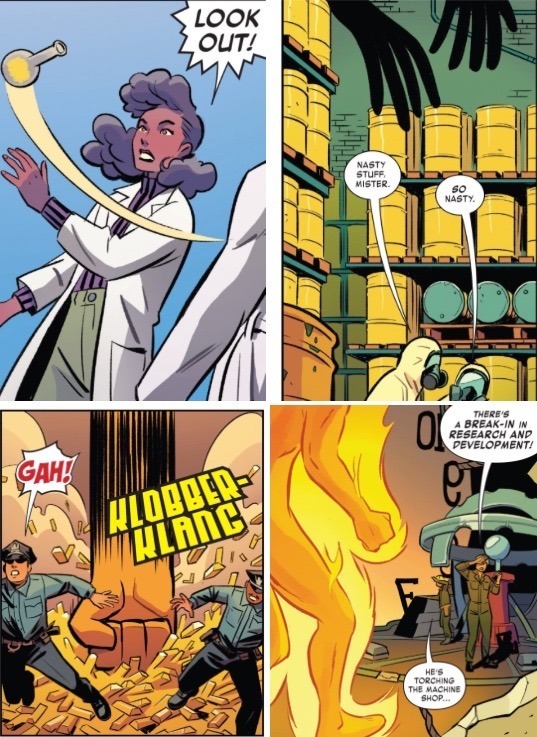
Back at school, Lunella offers up a bunch of the old Fantastic Four comic books to Eduardo, who is very excited to receive them. Eduardo and Zoe are Lunella’s friends, but not really the kind of friends that she can feel she can talk to, whom she can relate to on a deeper level.
Lunella’s parents come to pick her up after school and are met their by Ben and Johnny. There is something Ben and Johnny need Lunella’s help with, but Mr. and Mrs. Lafayette want nothing to do with it. They’re done with Lunella’s dangerous super hero adventures and want her to come home. Johnny is crestfallen that Lunella’s parents barely even remember the Fantastic Four. No one bothers to ask Lunella whom she would prefer to accompany.
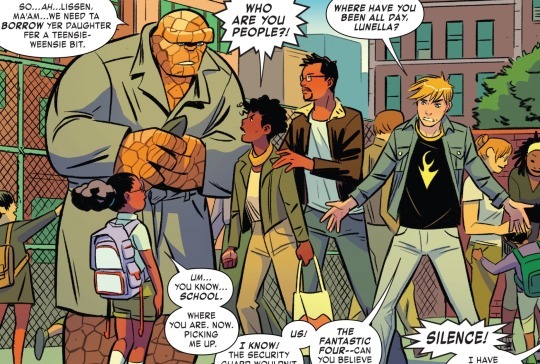
This whole argument over who Lunella is going to go with is interrupted by The Silver Surfer, who arrives above the school to deliver a dire message. Ben and Johnny both assume The Surfer’s message is for them, but it is actually meant for Lunella.
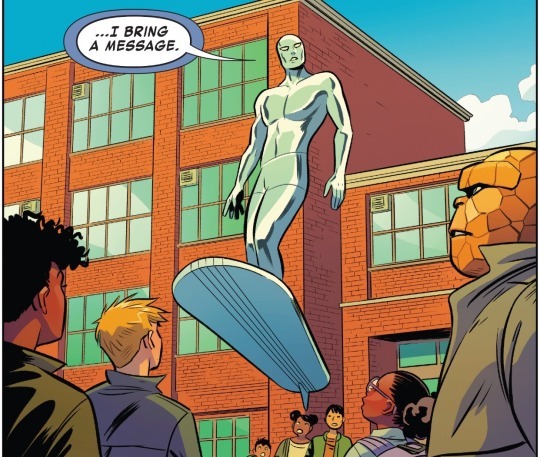
Ben and Johnny don’t take tio kindly to the matter and before you know it, yet another fight breaks out between The Thing, The Torch and The Surfer. A fight that only comes to an end when Lunella threatens to obliterate them all with her latest invention.

This stops them all in their tracks, whereupon Lunella reveals that her latest innovation is actually just her leftover sandwich from lunch. Still, it sufficed in getting the trio to quit fighting and The Surfer is finally able to deliver his warning. The Surfer no longer requires words to relay this warning, all that is needed is a mere gesture. He points to the horizon where the enormous figure of Galactus looms, peering out over the Lower East Side.
Lunella is of two minds in considering the world-ending threat that Galactus represents. On the one hand she is daunted over the prospect of having to face this threat without her trusty pal, Devil Dinosaur. On the other hand, however, she also feels solace that if the world is to come to an end at least Devil D will be safe back in his home dimension.

And it is here that the issue comes to an end with he promise of continuation in the next installment.
My ability to offer up at least the semblance of an unbiased review for this issue is all but entirely undermined by the fact that I am a huge Fantastic Four fan and so very much miss getting to read their adventures on a monthly basis. And if missing the FF is a kind of itch, then this issue of Moon G and Devil D definitely helped to scratch it. It is such a treat to get to see Ben and Johnny bickering again… and Lunella worked out great acting in the dual roles of Sue and Reed. This Fantastic Three might not be quite as good as The Fantastic Four, but it is an excellent consolation prize. Although what it most achieved was to remind me just how much I miss the FF.

It seems a good bet that The Galactus who appears at the end may not be the real Galactus. Instead of wearing his traditional mauve and blue armor, this Galactus is donned in armor of gray and gold. My guess is this being may actually be an artificial Galactus composed of those various items that were shown as being stolen earlier in the issue. Yet who might be behind this all? Is it some evil version of the Fantastic Four from another dimension? Is it the U-Foes? Some other dastardly threat? Whatever the case, I’m looking forward to finding out.
Although it is a minor complaint, I was a little confused by Lunella’s motivations for searching out the missing members of The FF. Clearly Lunella is very much missing Devil Dinosaur and I can get that she is longing to be able to talk with someone on the same intellectual level as herself, but this thematic was already very well addressed in the ‘World’s Smartest’ story-arc and it feels a touch like returning to the same well. Besides, Lunella could have just taken to searching out Reed, Sue and the kids simply because it is a challenge worthy of her intellectual prowess.
It was nice to see Lunella’s mom and dad again, although I continue to wish we could see further development of their characters. And where are the sentient robot duplicates Lunella made to cover for her when she was off rescuing Illa the Girl Moon? Again, these are the kind of complaints that are merely a product of my having become so invested in Lunella and this comic. These are good complaints… the kind of complaints I never have for comics I don’t really care about. (but seriously, Mr. and Mrs. Lafayette need some more screen time…)
There’s also a neat little side-joke for longtime Fantastic Four fans. Johnny shows contempt for the little robotic H.E.R.B.I.E. unit that Lunella uncovers and Ben jokes that Johnny doesn’t like him because he’s jealous of the time that H.E.R.B.I.E. had replaced him.
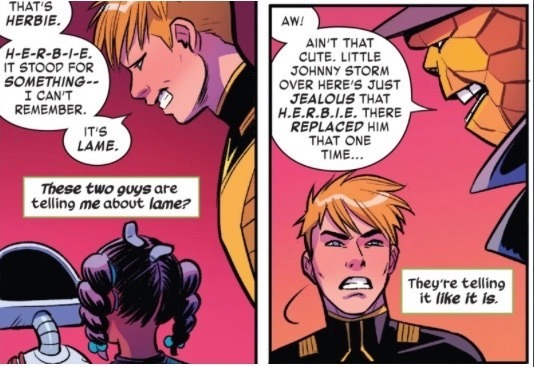
What Ben is referring to here is actually took place in a cartoon. The first Fantastic Four cartoon was produced in 1967 by Hana Barbara and was actually pretty terrific, with character designs by Alex Toth and stories derived from he comics themselves.

A second, more ‘kid-friendly’ series was produced in 1978 by DePatie-Freleng Enterprises. At the time Hana Barbara still owned the IP rights for The Human Torch so this new cartoon opted to replace him with HERBIE, an annoying Robot who was meant to be cute but was actually quite grating.
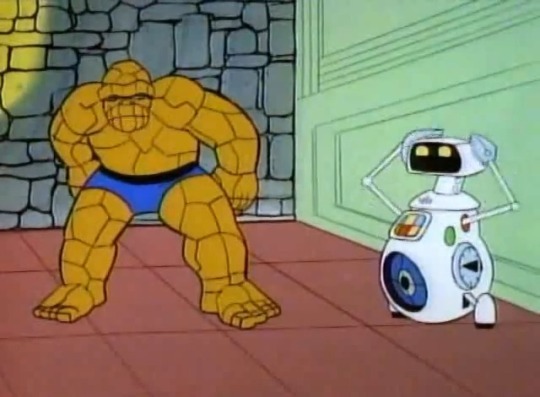
This cartoon was just terrible and hating HERBIE is pretty much a badge of honor among big time FF fans.
Anyways…. It is awesome to get to see Natacha Bustos illustrate The Thing and Human Torch. The Kirby-esque elements of her style are highlighted, but the over-all look remains very much her own. I have become such a huge fan of her and just love the way she draws The Thing and The Torch; her knack for fun and animated facial expression perfectly capture the playful banter between Ben and Johnny as well as Lunella’s exasperation over their nonsense. I especially liked how Bustos chose to depict Johnny in his flamed-on form. She opts for a minimalist approach, maintaining the expressiveness of in the face whilst also creating the illusion of dynamic flames dancing about. It’s quite well done.
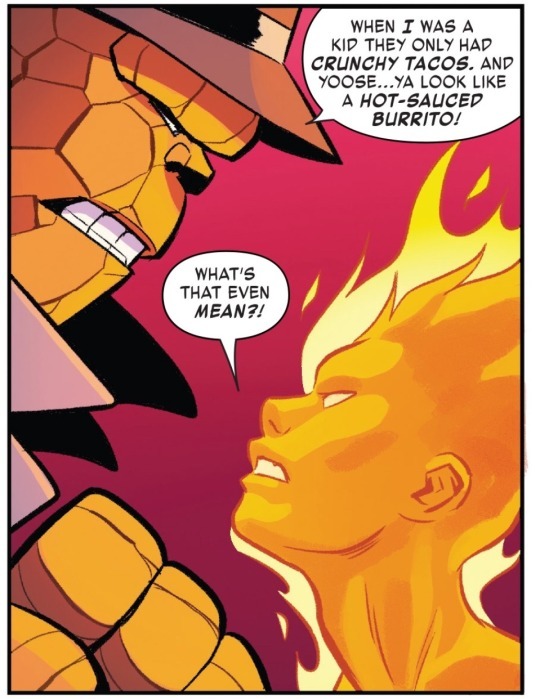
As always, Bustos’ art is augmented and brought to life by Tamra Bonvillain’s expert colors. Bustos and Bonvaillan work so well together, I could just gush over it all day. The aesthetic they have created for this comic has been a key feature to it being a comic easily enjoyed by older and younger readers alike. It’s… well, it’s fantastic!

Definitely recommended. I’m biased because it met my FF jones, but keeping that in mind I’m going to go headband give it Five out of Five Lockjaws anyway!

#Moon Girl and Devil Dinosaur#fantastic four#Brendan Montclare#Natacha Bustos#Tamra Bonvillain#spoilers#Inhumans#review
15 notes
·
View notes
Text
tonight on spontaneous media thoughts with a-flyleaf, some rambles on Paranoia Agent because yours truly just went and binged another old anime maybe two people and a paperclip have ever heard of!
so a few weeks ago I somehow got into the mini habit of watching videos on the side while drawing, splitting my desktop between art on one half and youtube on the other. somehow the videos of choice ended up being anime reviews, because I... I don’t know, really. :V I’ve watched like 5 anime now, this one included, and wasn’t particularly planning on adding any more to that little lineup. (keep meaning to check out cowboy beepboop but EH.) the lack of investment helps with the “wait did I just miss something” multitasking mood I guess...?
anyway it was a short-lived habit if only because I ran out of stuff that needed drawing aka Image Comic Process but I digress. Paranoia Agent first came to my attention indirectly through... something completely different! \o/
in entirely unrelated circumstances, stumbled upon this article a few days ago and the “realistic portrayal” example caught my attention. a brief comment dig later and the name was identified, and it... features a weird cartoon dog? the wikipedia premise intrigued me but it ended up on my hypothetical neverending list of stuff to check out.
I mention the review thing because, while procrastinating on everything earlier today, I found this video and it immediately caught my attention. and hey, looks like the whole dub is up on youtube, only 13 episodes so might as well!
...not that I’d. necessarily recommend the youtube dub upload. it lacks subtitles for the writing which is actually pretty damn essential.
go watch that review if you haven’t already, because it sums up the show better than I ever could and talks about what hooked me: a basis in psychology and experimental art.
AND NOW FOR MY ACTUAL THOUGHTS ᕕ( ᐛ )ᕗ (to be formatted in bullet points later probably, again tfw mobile) edit 11/21: done, plus some additional thoughts after reading a few reviews/analyses around the web
it practically starts with a bang via baseball bat, and imo the first four episodes are the strongest of the series. in addition to the clever toying with art style as the video describes, we’re introduced to an ensemble cast of not necessarily likable but no less complex characters, and I always appreciate it when media doesn’t seem to be hitting you over the head (harhar) with LIKE THIS PERSON DAMMIT.
while I don’t have dissociative identity disorder and thus can’t speak to accuracy in its portrayal or weirdness in the subplot’s resolution, episode four three* also had one of the first examples I’ve seen of a character with “multiple personalities” that didn’t lean on the tired but one of them... is a MURDERER schtick.
*I initially got the numbering messed up here; the episode with the character who has DID is third, not fourth.
the entire series explores the idea of fiction and reality - no, this is neither the time nor place for the Shipping Debacle(TM), moreso in how fiction is a form of escapism both destructive yet necessary in just about everyone’s lives. the experimental elements play with this well, forcing the viewer to think about why the art is changing the way it does.
until around the end of episode 4*, it’s relatively clear when we’re getting a glimpse into a character’s psyche vs seeing what’s actually going on. and then the next installment hits, and it honestly wouldn’t surprise me if a lot of people bail at this point. it’s not bad necessarily, but the line between fantasy and reality isn’t just blurred - save for a few quick cuts, said line is utterly trampled. symbolism runs rampant and it can be tricky to figure out exactly what’s Actually going on, if anything at all - more on this later.
*e: this time I actually do mean the fourth episode.
on the topic of symbolism, there’s definitely something symbolic going on with the crows/ravens (death?) and to some extent color (namely gold/yellow, green, and red) but I haven’t quite put my finger on it.
you know that thing the video says about Lil Slugger being a manifestation of mass hysteria and destructive escapism? (if you don’t, what are you waiting for >:V it’s about 10 minutes long if you skip the spoilery part.) turns out, he really truly is, and it’s not just metaphors.
spoilers ahead; I’d recommend going in blind but use your best judgment, I know I might not have been so intrigued if not for reading the entire wikipedia plot synopsis in advance. why do I keep getting into media by knowing the Big Reveals first.
on one hand, I really like Lil Slugger being both symbolic and a literal supernatural threat. what I’m much less sold on, however, is how the less explained aspects are incorporated, namely towards the end. (big spoiler warning again, last chance!)
so what exactly DID happen to Harumi with the weird clownish smile makeup? what’s all this prophetic babbling from an old dude who really likes chalk (and whose ramblings admittedly might’ve made more sense if I could actually read his stuff), and how does he know it? what’s the deal with the otaku dude and his magical talking figurines? who knows! who cares, I guess. it’s all in the name of thematic significance - or to put it ironically, ~it’s media~
I can respect that as an artistic direction but it can feel a bit stranger than necessary, and I wasn’t a huge fan of the ending. so, what, suddenly chief’s 2d dream world is an actual real place he goes to? the “darkness closing in” is an actual black blob? holy shit, I really must emphasize the otaku dude’s weird voodoo sculptures and bascially everything else about him. th... the ex-“good cop” is now a wannabe superhero?? you do have to read between the lines to an extent to really Get the characters at times, which I actually like, but imo this was pushing it.
actually even before the climactic sequence I was... less than thrilled with the wife’s monologue. for the most part the show is good about not talking down to the viewer, obligatory exposition sprinkles aside, but just in case you weren’t sure what the themes were yet, here they are ft. odd visual echoing that doesn’t seem particularly relevant to the speaker’s state of mind!
there’s a bit more thematic narm towards the finale, especially from local sidekick-turned-video game hero, but at that point I was too busy wondering what the hell was going on to be too bothered.
e: several analyses and a rewatch later, the end of Harumi’s episode seems less nonsensical. it still doesn’t quite explain when she found the time to throw on all that makeup, but as with many other aspects of the series I was left baffled by at first (up to and including weird old math man), it makes much more sense thematically. Paranoia Agent is not a show meant to be taken at face value and trying to understand it all literally is an exercise in futility - not for everyone, but if you are willing to reconsider how you’re parsing it, it’s worthwhile.
...I’m still confused by otaku dude’s figurines, though >:V
/endspoilers (for now)
DESPITE the spoiler-loaded nitpicking above, overall I found it a solid watch - and the irony of bingeing it to procrastinate on school isn’t lost on me, especially after an all-too-relatable vignette featuring a student in the throes of quadratic equations.
while it definitely includes some darker themes, up to and including an episode about three internet friends meeting up to carry out a sort of suicide pact (which again probably would’ve been clearer if the version I watched had subtitles for text), the tone never feels particularly hopeless. it deals with the self-detrimental effects of overindulging in escapism, sure, but isn’t exactly MEDIA IS BAD TECHNOLOGY IS SCARY THE NEW GENERATION SUCKS. (one character has a similar attitude but it’s based more in nostalgia than hatred of the modern.)
reality sucks but you gotta face it and own up to your fuckups, pal, sorry! but rest and respite are important, too, lest you end up like the animation monkey whose very animation becomes rougher as the sleep deprivation really kicks in.
yes, monkey. not literally but definitely in design (no sameface \o/) and arguably behavior. there were a few comedic moments throughout the show, albeit often dark and/or satirically based so YMMV on how much they actually lighten the mood. for what it’s worth, the episode with the aforementioned suicide pact was probably the overall funniest.
overall I would recommend it as a good thought-provoking series, although if you’re having trouble at the fifth episode I won’t blame you for not sticking it to the end. personally, I kept watching because A) I wanted to see just how the murderous baseball kid mystery turned out & B) the art and symbolism shenanigans up to that point, definitely including the intro, had already given me a few Ideas(TM) and I wanted to see what else was in store. worth it? sure, but don’t expect too many explanations on the supernatural parts.
okay one more spoilery detour - and it’s a VERY BIG spoiler that I am actually going to encourage you not to read if you plan on watching. seriously. (e: format isn’t a mistake, I think it works better connected in paragraphs.)
sooo after skimming the plot synopsis and watching that entire review video, I already knew the thing about Maromi being based on a dead dog and Lil Slugger being the mystery assailant. what I did not expect was even that being a lie, in a way that I won’t specify because I’ve said too much already. and while I question the use of what I’m guessing was pms of all things, I actually really liked that twist.
HOWEVER. given that it all comes back to Tsukiko, she was fucking robbed in the character arc department. I get that she’s quiet and secretive so we don’t get any real details on her past until last second, which imo was a really forced reveal (seriously what is WITH those anime girls and their magic prophetic video game), and again I do like how she pretty much has a victim complex and that basically causes everything.
what I don’t like is that we needed cop superhero dude to lay it all out for her in terms of Big Realization Moments. everything only really gets “resolved” because she finally comes to terms with & takes responsibility for her mistake, but what leads her to this action? guys yell at her for fucking up and everyone gets consumed by inexplicable black ooze? EHHHHHHH I don’t buy it.
the chief’s mini-arc with his wife, which unfortunately was more told than shown (sensibly, so we could get Slugger’s reactions to the story, but it doesn’t mean I’m happy with it), was predictable but IMO believable. I definitely don’t think every story has to have clearly-defined protagonist/antagonist characters, especially with the “antagonist” here being a man vs society type of setup, but the end sequence seemed confused on who the real “hero” was supposed to be.
Ikari got the Big Moments of realizing he couldn’t live a lie forever, of smashing his dream world. Tsukiko... gets to go back in time and hug her dog, I guess? where was her moment, however subtle, of realizing she actually doesn’t NEED this little pink dog to save and protect her from reality. if that was supposed to be conveyed when her younger self started making stuff up it... lost me, unfortunately. as far as I registered it went straight for the dog and apology.
e: and you know, after all the aforementioned reading, I’m still inclined to agree with my initial thoughts - HOWEVER. this is a show that lives, breathes, thrives on thematic significance. character development and miniature arcs happen, absolutely, but they’re not the focal point. I can appreciate the ending’s direction much more if I kick conventional thoughts on character progression to the curb.
oh, and the intro? with everyone laughing with chaotic and/or destructive backgrounds while the random mysterious old people get a fancy restaurant and the goddamn moon? guessing the latter is because ~universal themes~ or something but the formal setting after a series of Heck is a moment of fridge logic - the woman’s homeless. she’s probably no stranger to more ravaged settings.
e: oh yeah, and something else I noticed about the intro - everyone is laughing, yes, but Tsukiko’s doesn’t seem... real. everyone else (minus Lil Slugger I guess but his eyes aren’t shown) has the characteristic squint of a genuine smile, but she’s wide-eyed as ever. maybe foreshadowing how she’s the one behind all this...? hrmm.
alrighty no more spoilers For Real This Time, just some miscellaneous notes that didn’t really fit elsewhere
one side character has the same voice as my favorite character from Urasawa’s Monster so that was neat. turns out detective #2 also shares actors with Monster’s protagonist, which took me longer to catch onto but was VERY amusing once noticed.
there’s no overt fanservice, minus like one or two questionable angles that aren’t even in the spotlight. a couple episodes have some Unfortunate Closeups but they’re entirely in service of the story; you’re definitely not supposed to be comfortable with it.
WHERE ARE THE OFF CROSSOVERS.
e: actually, for various spoilery reasons, I would not be the least bit surprised if this influenced OFF to some extent. but that’s another ramble for another time.
#THIS GOT REALLY LONG but I gotta dump Media Thoughts sooner or later#’’what about psmd’’ I told myself earlier I was gonna save that for break since I think I’m nearing the endgame#and also mainly Procrastination Motivation. theoretically. look how that turned out I love irony V:#.rtf#suicide mention -#Paranoia Agent#dream island obsessional tag
9 notes
·
View notes
Text
2017 Writing Round-Up
source: https://trey.dreamwidth.org/584.html
Total year-long word count: 16,200
Word count by fandom:
BnHA: 12858
Assassin’s Creed: 2562
Original: 780
Fics completed: 3 oneshots
Works-in-progress: 2
This year I wrote and posted:
He Woke to Fire chapter 2
Rocket
What Goes Around chapters 1 thru 4
Wind
Slut Shaming
Looking back, did you write more fic than you thought you would this year, less, or about what you'd predicted?
Way, way more. I only started on He Woke To Fire last year, expecting it to be a short two-shot. Now not only has it evolved into a 4+ chapter fic, I also got into BnHA and have been inundated with new fic ideas and have actually, for the first time in my life, started organising and planning my fics in earnest. I only expected to write one (1) short little chapter for HWtF this year, and like. Look at that.
What pairing/genre/fandom did you write that you would never have predicted in January?
Fandom: BnHA!! I actually got into it because I saw an artist that I followed from another fandom drawing tododeku fanart and I was like ???? I’ve seen the split-hair guy around what show is this? and that was the first actual post that I saw having the title of the anime on it. I didn’t expect to fall as in love with it as I did, because I’ve been getting tired of shounen tropes, but BnHA has some really fresh takes on ideas and is quite self-aware/genre-savvy/trope-subverting on many fronts so I enjoyed it immensely.
Pairing: TodoBaku. I haven’t actually posted any todobakus, but I have been writing quite a few snippets here and there.
As mentioned above I got into BnHA fully prepared to ship tododeku.
Bakugou was introduced and I was like “Hah rival character I’m sure there’s BakuDekus out there” and I was right, and I did like it, because I like rivalships, so that was expected.
Then while browsing BakuDekus I found KiriBakus and read a few and I was like “cute but why” so I went on watching the anime and reading the manga expecting to start shipping the KiriBakus any day now but I was,,,, still not shipping both tododeku and kiribaku.
On the other hand, the Sports Fest happened and I had a sudden ‘oh hey imagine todobaku lol’ and then immediately after went ‘!!!oh hEY IMAGINE TODOBAKU!!!’ and here we are lmao.
I wrote fluff. I’m not kidding, this was the weirdest direction I’ve ever taken my writing. I’ve been a consummate angst slut ever since I fuckin knew how to read, and while I do read the Simple Fluff stories every now and again, they’ve never been things that truly made me happy as a reader. So the fact that I’m writing what’s basically a pure-hearted friendship fic is... mind-boggling to me, both as a reader and a writer.
What's your own favorite story of the year? Not the most popular, but the one that makes you happiest?
Oh... this one’s hard, but I guess He Woke to Fire wins that spot.
For one, it’s angst, and I’m an angst whore.
For another, it’s a canon-divergence centred around the death of the main character before the story even began, which has seriously been fascinating (and it also gave me a long existential crisis at one point) to contemplate.
Further, the substitute main character is a canon character who got like, two speaking lines and half a minute of screentime before dying unceremoniously, so it’s really given me a real mental workout trying to flesh out his character.
Lastly, there’s a lot of psychological, ideological, and philosophical themes in original canon that by necessity needed to be addressed and recontextualised in order to suit this new AU, and I think I handled it fairly well so I’m really proud of that!
Did you take any writing risks this year? What did you learn from them?
Writing fluff. As mentioned, I have literally never touched fluff ever in my (admittedly sparse) writing history. It has posed an interesting challenge in the form of needing to really think about ways to throw complications in the plot and resolving them without emotionally or physically traumatising the characters in any significant measure.
Character voice switching and a large cast. Really getting into multiple characters’ heads, understanding their personalities, strengths and weaknesses, asking myself ‘why is this character taking up this narrative role and not this other one?’ and trying to overcome biases for my faves. It’s not really an epic, and the background characters remain in the background even if they do do things, but I think I’ve gotten a little better at a more holistic approach to writing multiple characters.
Your best story of this year: hhHHHH He Woke to Fire. Makes me so happy.
Your most popular story of this year: (Based on AO3 stat numbers) that would be What Goes Around with 271 Kudos, 33 comment threads, 54 bookmarks, 112 subscriptions, and 2053 hits. I am... speechless. Thank you all so much.
Story of yours most under-appreciated by the universe, in your opinion:
Rocket. C’mon guys. Why have the parallels between Uraraka’s anti-gravity powers and Bakugou’s blasting powers and outer space travel never been talked about? Bakugou’s a literal human rocketship; why would he ever be afraid of Uraraka’s Quirk????
Most fun story to write:
... I had to resist the urge to simply answer this with ‘writing is not fun’ because I get writer’s block really really quickly. I second-guess every plot point as soon as I put it down and I struggle through every line. I write because I want need these stories to exist, not because I enjoy the process of writing. BUT I won’t be a cop-out so I’ll make an actual selection here: Rocket, because fight scenes are fun to imagine. Even if the point of this fight scene was that it wasn’t much of a fight.
Story with the single sexiest moment: The legend of Altaïr’s soul and the djinn beneath the waves in He Woke to Fire. I don’t care if ‘sexiest’ here was meant to refer to literal sexual themes I’m just taking it as ‘moment that made me the happiest’.
The invention of this single legend allowed me to talk about a lot of aspects of Altaïr (his immense combat prowess, his cold personality, his fear of water, his death by suffocation) in metaphorical and mythical ways throughout the story and I’m very happy I came up with it by myself.
Most "Holy crap, that's wrong, even for you" story: Thing is, I am well aware of how fucking messed up my imagination can get, so there’s literally nothing I can come up with that would surprise me or anyone who knows me. He Woke to Fire is the most thematically heavy and graphic one I have published I guess.
Story that shifted your own perceptions of the characters: HWtF again.
Like I said, it actually gave me an existential crisis that lasted practically a whole year because I realised halfway through that I was writing the story as though Kadar was just a cuter Altaïr, which he is obviously not.
So I had to go back and replan the entire fic again which then made me introduce Maria as a major character, then I had another crisis because I actually hate the way Maria has been portrayed and treated in canon (and a lot of fanon too for that matter). So I had to really sit down and think about a way to reinvent her in a satisfactory manner for this fic.
I’m still not entirely sure that I’ve got it, for either of them, but goddamn have I had to try.
Hardest story to write: HWtF, see above.
Biggest disappointment: The third chapter of What Goes Around. The writing there feels so stilted and forced, and a lot of the rhythm/word flows/pacing is very repetitive. Despite knowing exactly what I wanted to have happen, I struggled through the entire chapter and it shows.
Biggest surprise: Second chapter of WGA, that I wrote in the same sitting as the first chapter, that I wrote in the same sitting as the second chapter of HWtF. It was the easiest time of writing that I have ever had in my life ever and I didn’t even have to think - except for like, once, when I forgot to mention a detail I thought I had already written but I hadn’t actually so I had to backtrack a couple lines. And usually when I write that fast and fluidly, I’ll come back and read it later and find holes and logic errors and sections of senselessness but nope. It’s completely coherent. I have never written like that before or since.
Most unintentionally telling story: Probably What Goes Around.
I generally try to mention every single student of 1A at least once, and Todoroki’s part in the story was supposed to be limited to that single incident with Tsuyu and then he was done. But he’s kept popping back in in subsequent chapters like a creepy stalker because my ridiculous TodoBaku-shipping heart just wants them to interact more goddamnit.
Now I’ve just accepted that in the WGA canon, Todoroki has a crush on Bakugou and is actually following him around like a lovesick puppy and Bakugou just hasn’t really noticed.
Favorite opening line(s): From Wind:
A wind. There’s a wind that blows across the land, a soft sigh on the bright sand.
Favorite closing line(s): From He Woke to Fire:
“You’re not real,” Malik says with heartbreak in his voice.
“I’m not,” the vision of Altaïr says with Altaïr’s voice, sounding surprised Malik could tell. Then with eyes glowing gold, reaches out a hand to caress Malik’s face, “but you could be happy here with me.”
Tears slip down Malik’s cheek as he leans forward to catch ‘Altaïr’s lips in a kiss.
“I couldn’t,” he says, voice breaking, arms wrapped bone-crushingly tight around ‘Altaïr’, “but by Allah I wish I could.”
Favorite 5 line(s) from anywhere: From What Goes Around:
Katsuki took his food seriously. His old man had what his mum called the ‘art student diet’ where he, if left to his own devices, would just eat four boxes of chicken nuggets at three AM in the morning and completely forgo lunch and dinner, and it pissed her off to no end. So she had Katsuki trained to cook as well as she could (if not better) so that he could force his dumbass dad to eat a decent meal every once in a while whenever she had to go out for a shoot. Sixteen years of life and nearly ten whole years of (violent) culinary training later, Katsuki figured he knew his way around food.
Whatever this… stuff was? Not food.
He had to close the fridge door and spend a few minutes just breathing because no. Just. Holy shit, no.
This one’s my favourite because it’s me calling myself (and several other people I know *cough*) out for our garbage ‘art student diet’ while also talking about the BakuParents.
Top 5 scenes from anywhere you would choose to have illustrated:
He Woke to Fire: Altaïr gasping and dying in the sealed cavern, desperately trying to claw his way out till his fingernails are bloody, then scratched off, the dying firelight and the scattered corpses around him.
He Woke to Fire: Kadar clinging gracelessly like a worm to a rafter, looking over at Altaïr in the high narrow room, and seeing birds in cages.
He Woke to Fire: A badass Kadar with hardened eyes, wielding the eagle-pommel sword - Altaïr’s sword.
What Goes Around: Bakugou, so sleepy he can barely keep himself upright, exhausted and rumpled from hard work, giving a jittery Kaminari a one-armed hug until he calms down and feels comfortable in his own skin again.
Rocket: I would love to see this entire ‘fight’ animated but in particular, the part where Bakugou is just grumpily drifting along in the air waiting to be declared the winner.
Fic-writing goals for next year:
Finish HWtF and WGA. They’re my first proper multi-chapters and I do actually kind of know how they’re supposed to end as well as sort of how to get there, so I really want to see them through (as well as not being a dick and leaving my readers hanging)
bktd week. I actually have all the lore and outlines ready, and the outlines have (almost) all the dialogue already written. So hopefully I can actually see it through, and on time for the week.
Start working through my Endless Prompt List which is mostly self-prompts. I’ve taken screenshots of my yelling in great detail about many many ideas and filed them neatly away in the hopes that I actually get around to writing them.
My final year in university starts in the second half of 2018, and I’ll be busy with my graduation projection and other important school work, and preparing my animation portfolios and showreels for future employment, and I’ll hopefully be able to get an internship which will be really taxing... So I don’t have very high hopes in terms of my writing for the next two years. Writing’s only a hobby that’s just simply neither important nor urgent in the grand scheme of my life so it’ll have to take a backseat.
1 note
·
View note
Text
The 3rd Annual Redford Awards - Winners
Hello, everyone, and welcome to what I’m calling “The Redfords,” named so because (as of this posting) the great Robert Redford has retired from acting, and naming these after him this time around felt like a decent way to honor that screen legacy, even though the name for what is basically the awards show I would run if it were my Oscars changes every year anyway, and it will likely change again for the 2019 awards (though definitely into something more permanent, I promise this time). It has been a long and arduous road getting here, so much so that I actually had to push back the announcement of these winners from the intended date by a day due to both scheduling issues and the greater context of what truly deserves Best Picture being really, really hard to parse out this time around, especially considering that the actual value of Best Picture has come to mean substantively more to me this year than in any year past what with the presence of Black Panther in the category at the actual Oscars and all that that means going forward for the broader culture. Still, I did manage to choose one; the awards have been completed, the winners have been chosen, and it is now finally time to announce the winners for the third annual Redford Awards.
Best Sound Design: First Man

Usually when I do these things, I tend to just capitalize or italicize who the winner is as I post the nomination list a second time, but the fact is I already posted the nominees once (if you need a refresher I will post a link to them with this announcement) and I don’t want to take up a bunch of space being redundant when I could instead say something nice about the winners and explain why I chose them specifically. Suffice it to say even though First Man didn’t rake in what it should have at the box office relative to quality, its sound design was undoubtedly the most impressive thing about it apart from every element of the lunar sequence coalescing into a truly jaw-dropping stretch of filmmaking. The sound design, yes, did also contribute to that stretch, but First Man is also the movie of 2018 that did its sound the best all the way through, even considering that while A Quiet Place’s whole thing is pretty much built around sound, it’s more about the sound editing than the sound mixing, and one half of a victory won’t win you the whole thing.
Best Visual Effects: Avengers: Infinity War
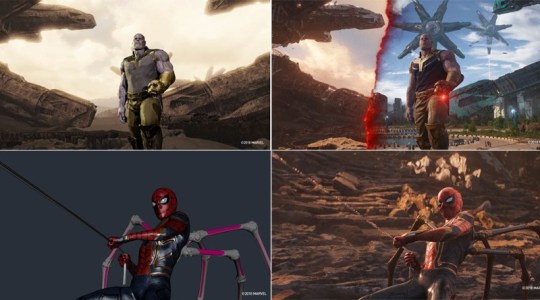
This one is generally pretty self-explanatory, but basically the central conceit behind picking a winner is not necessarily that it has the most visual effects, but that it has the ones you either don’t see or forget are visual effects during the movie because they make it believable that any of what’s happening is even possible. This year, sure, that happens to be the same movie, but what can you say? It deserves the prize, and I’m more than happy to give it out.
Best Screenplay: Daveed Diggs & Rafael Casal, Blindspotting

The Oscars had a decent line-up of screenplay nominations this year, but considering the sheer volume of immensely creative scripts they had to choose from, most of them are fairly mediocre choices, with the likes of Sorry to Bother You and even Bo Burnham’s critical hit Eighth Grade being left out of the conversation, which is a real bummer considering Original Screenplay was Eighth Grade’s best shot for any Academy Award nomination. Perhaps the most overlooked, though, even in terms of what people were saying should be nominated in the Original Screenplay category, is absolutely Blindspotting. This script is about as sharp as they come, with witty, insightful commentary on socio-political issues, characters that you grow to care about, enough comedy to keep the whole thing going without feeling too much like a drag, and one of the most creative, original, and tense climaxes to a movie not only of 2018, but of the past decade.
Best Original Score: Justin Hurwitz, First Man
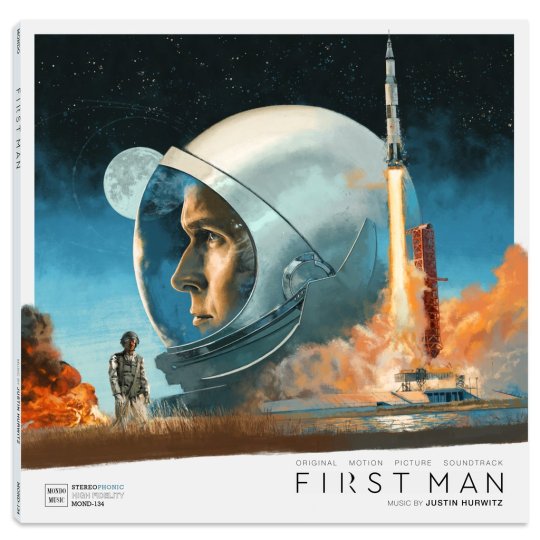
Future film lovers, and specifically film music lovers, will not look back kindly at the Academy’s decision to not even nominate this at the Oscars in this category. Justin Hurwitz’ score for first man is, both paired with the film and taken on its own merits, the most bold, unapologetic, and strangely unwieldy score of all of 2018, and while I do love Nicholas Britell (who should have won for Moonlight, by the way), this is the year that Hurwitz proved to all of us that yeah, he actually is the real deal.
Best Cinematography: Alfonso Cuarón, Roma
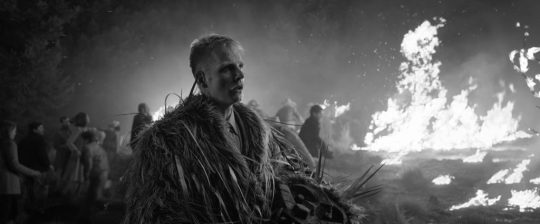
Just about anyone in my immediate sphere (in fact, even most people out of it) is already aware of the Academy’s decision to air this category (as well as editing, makeup, and short live-action film) during the commercial breaks at the Oscars, how stupid a decision it was, and how it’s been reverse due to film professional, critical, and general audience backlash, so I’m not going to get into those here because it’ll take too much time, and other people have ways of explaining it better than me anyway, so I’d recommend reading one of those posts/twitter threads/whatever. But yeah, let’s not play too much with our food; by far the best shot movie of the entire year is the one the writer and director of Children of Men and Gravity shot himself without the assistance of his usual go-to guy, Emmanuel Lubezki. The black and white brings a sharpness to the picture not often seen, the long, sweeping shots of life for Yalitza Aparicio’s Cleo as well as the city she lives in are well-staged and executed, and it’s all handled so smoothly you’d be forgiven for thinking this one was shot by an actual perfectionist A.I. or something. Seriously, folks, it’s stunning to look at.
Best Editing: Barry Alexander Brown, BlacKkKlansman

Studying film more and more over the years of doing this movie critic thing just because I want to and enjoy it has given me a lot more appreciation for the nature of film editing. A perfectly time cut or a long, unbroken sequence that’s well-shot will sometimes do the trick, and occasionally it’s more about what you don’t notice, but sometimes the best editing is just in how it feels to watch a movie strut its style and stick in your memory, and no film in 2018 did that like BlaKkKlansman.
Best Character Design: Ruth E. Carter, Black Panther
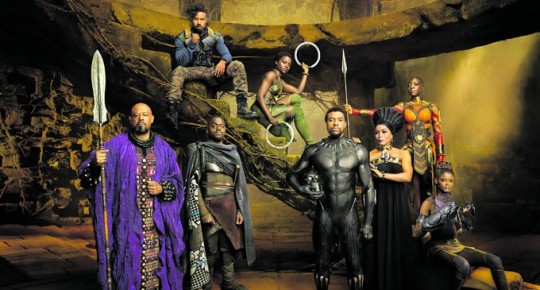
This category is really a combination of the Makeup & Hairstyling and Costume Design categories at the Oscars, made so in large part because I don’t understand enough about how much make-up and hairstyling impacts an overall movie (unless it’s like, really drastic, like Shape of Water fish suit drastic) and they’re both extremely important elements contributing to an audience’s overall impression of a character without said character even talking or doing anything. Presenting the whole package as one unit also acknowledges the aesthetic choices involved in a character’s overall look, and I like that, so that’s how I made it. Spider-Man: Into the Spider-Verse very nearly took this category for how beautifully and differently rendered most of its characters were (especially the titular ones), but ultimately I think this one should go to Black Panther, not just because African tribalism and the clothing therein is a refreshing thing to see presented on screen in such vibrant and prideful fashion, but also because adapting costumes from comics into live-action is far more challenging than it sounds, and the fact that they pulled it off this well is something to commend.
Best Production Design: Eugenio Caballero, Roma
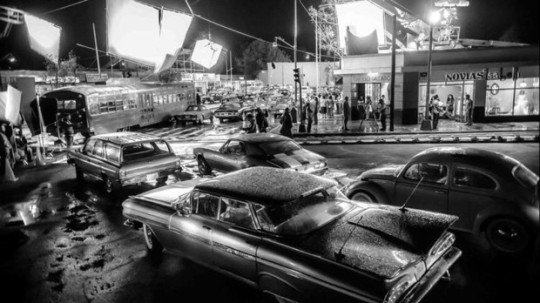
I was really tempted to go with Crazy Rich Asians on this one, but I soon realized that I was continuously thinking of this the same way most people probably think about visual effects: that the best production design meant the most production design. And while the production design in Crazy Rich Asians is beautiful and vibrant and deserves praise, it didn’t necessarily give the audience a whole lot of information about the characters beyond how rich Nick’s family actually is. Roma, on the other hand, had five entire blocks of Mexico City built from scratch based solely on its director’s memory, with not a single misplaced building, prop, or set piece in its entirety. Maybe there’s just something special about that that hits me harder than the design for Crazy Rich Asians did, but I also think it was the best production design in service of its story (both thematically and narratively) in 2018.
Best Supporting Actress: Rachel Weisz, The Favourite
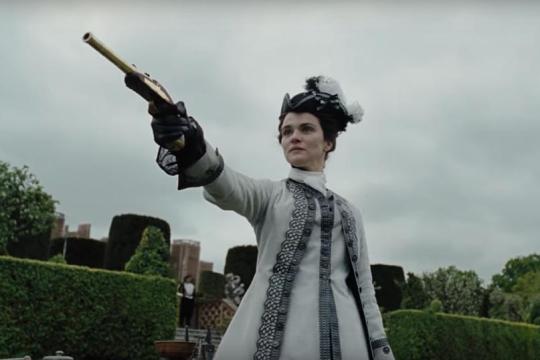
And now we’re into the acting categories, the final stretch of road on the way to crowning that Best Picture winner I agonized over for almost an entire month. Marina de Tavira’s fantastic turn in Roma almost stole this one out from under Rachel Weisz, but like the viper she is in The Favourite, Weisz bit down hard and came out the other side with a Redford in her hands. It’s honestly astound how well she commands the screen in this movie (and a little bit scary), but it is all the more impressive when put next to the caliber of performances her co-stars are giving and allowed to shine just the tiniest bit brighter.
Best Supporting Actor: Ben Foster, Leave No Trace
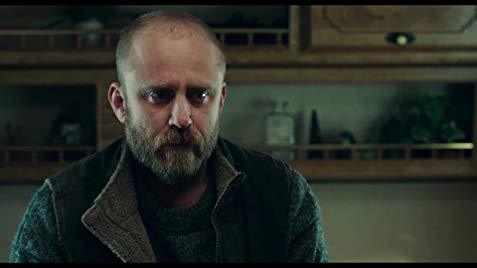
No one except critics online talked about Leave No Trace during awards season, and I’m sad about it. That’s not the reason I’m giving it an award, but I just wanted to put that out there for good measure. Truthfully though, this is a fantastic performance once again from an increasingly underrated and undervalued actor (perhaps the best he’s ever been), and the best supporting performance from any male actor in 2018. I really do hope that sometime soon, the Academy and everyone else will finally give Ben Foster the recognition he deserves beyond his Hell or High Water nomination a few years ago.
Best Actress: Olivia Colman, The Favourite
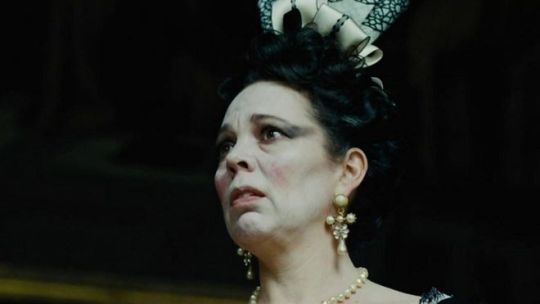
Most, if not all, critics and general audiences (including myself) peg this award as going to Glenn Close at the Oscars this year for her performance in The Wife; however, I haven’t seen that movie, so I can’t nominate her for an award in an awards package that I personally put together, but best of luck to her at the ceremony. Despite her absence, there’s still an absurdly strong field of nominees, and none stronger than Olivia Colman’s performance as Queen Anne in The Favourite. She genuinely makes every single moment she’s on screen feel like something she, and only she, could believably do, wordlessly running the gambit from hilariously emotional to genuinely terrifying and making it all seem true.
Best Actor: Christian Bale, Vice
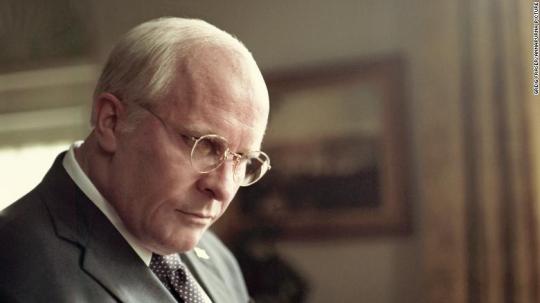
I don’t love this movie nearly as much as the Academy does, but the one thing we do both agree on about it is that Christian Bale absolutely stuns as former VP Dick Cheney, though a little help from the makeup department didn’t hurt and they’re sure to win that award at the actual Oscars ceremony. Plenty of other actors gave admirable performances in 2018, especially Bradley Cooper and Rami Malek (who also happens to be the best thing about his mediocre movie that no one seems to recognize is mediocre), but none of them ever truly became their characters quite the way that Christian Bale did with this terrifyingly accurate portrayal of perhaps the most powerful vice president ever to set foot in the White House.
Best Director: Spike Lee, BlaKkKlansman
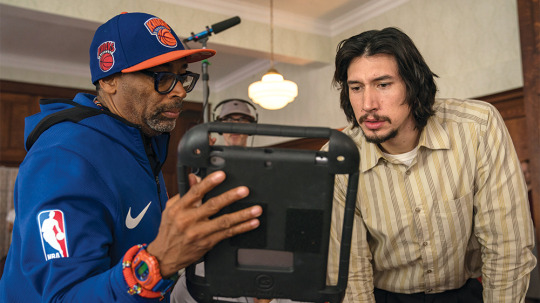
Yes, absolutely, Alfonso Cuarón will be winning this one at the Oscars and probably deserves it more from the Academy’s perspective, but Roma relies on more than just the direction to keep it going. So does BlaKkKlansman I suppose, but the point is that the latter is fueled by its direction while the earlier is more guided. Both are spectacular feats and truly fantastic jobs done by both Cuarón and Spike Lee, but if BlaKkKlansman doesn’t have Lee’s fingerprints all over it, the entire thing could cascade and fall apart as a movie, whereas Roma might be okay but just might not look as pretty and feature a few more cuts; and that is why I’m giving Spike Lee Best Director.
Best Picture: Spider-Man: Into the Spider-Verse

When people typically think “okay, what is the best movie I saw this year,” they’re usually actually thinking about their favorite because art is a subjective medium in and of itself and there are only so many things you can study and observe about filmmaking and how it all comes together that aren’t subjective inherently, so they can’t really be blamed for it. What’s the best to you may not constitute what the best is to someone else, and it plays out like that with most people, and generally always will. Best Picture in the context of something like the Redfords, then, owes its justification to a few key beliefs I have about what a film I want to call the best of the year might look like; namely, these beliefs are that it should have something to say (whether positive or negative) that resonates with the audience it’s trying to reach, tell its story in an innovative and unique fashion, and set the stage for whatever corner of the medium it occupies to engage in an acceptance for change going forward. The change doesn’t have to be big or even particularly important necessarily, but it should be there nonetheless. This awards system and set of beliefs is often why what I consider the Best Picture of the year for an awards package like this doesn’t usually line up with what my favorite movie of that year actually is. That all being said, Spider-Man: Into the Spider-Verse is what I truly believe to be the best example of this from 2018. It reformed and re-shaped the genre it was in to such a degree that it elevated the status of the animation medium, the message about anyone being able to “wear the mask” of one of the most popular and beloved pop culture icons of all time also being a metaphor for facing fears, accepting yourself, helping others, and being an inspiration to people as you lead by example is a genius move that I can’t believe a theatrically-released, feature-length Spider-Man movie hasn’t attempted before (but is so perfectly suited to animation I guess I understand the hesitancy), and the method by which it told its story was so incredibly unique and innovative that every subsequent attempt to animate the same way this movie does to adapt anything will inevitably be compared to Into the Spider-Verse for the rest of time. That, and the fact that it’s also probably the most widely accessible movie of the three I had running for this award (the other two were Roma and Won’t You Be My Neighbor? for context), make it not only the ideal candidate, but the appropriate choice for the Redford Awards’ title of Best Picture.
And there you have it, the Redford Awards are now officially complete. I’ll forgive you if you saw the length of this post and just “nope”-d outta there, but for the rest of you who stuck around and read to the very end, thanks for sticking with me all this way, and I hope you enjoyed your read. See you next year!
Link to nominees: https://thefriendlyfilmfan.tumblr.com/post/182203750531/the-3rd-annual-redford-awards-nominees
#Redfords#3rd#third#annual#3rd Annual Redfords#The Friendly Film Fan#Spider-Man: Into the Spider-Verse#Spike Lee#BlacKkKlansman#Christian Bale#Vice#Olivia Colman#The Favourite#Ben Foster#Leave No Trace#Rachel Weisz#Eugenio Caballero#Roma#Ruth E. Carter#Black Panther#Barry Alexander Brown#Alfonso Cuaron#Justin Hurwitz#First Man#Daveed Diggs#Rafael Casal#Blindspotting#Avengers: Infinity War#ILM#Industrial Lights and Magic
0 notes
Note
[1/2] Hey, your question about why people think Mystery Man is Gaster, these are the usual reasons I see: Gaster's stats are straight 6's, and the fun value needed to see Mystery Man is 66. Other fun values in the 60s relate to Gaster. Memoryhead's attacks look like the Mystery Man's face, just less broken.
[2/2] Couple more reasons that also assume a link between Gaster and the skelebros: Mystery Man’s door sprite, spr_greydoor_0, is the same as Sans’s door sprite, spr_sansdoor_0 (and Papyrus’s door sprite if you removed all the signs on it.) Mystery Man’s room and Papyrus’s room play mus_dooropen and mus_doorclose respectively, and are the only places outside of a pacifist ending they play.
Thank you for this. While I was hoping for something with a little more substance to it, this gives me something to work with, even if it is only to debunk the evidence presented.
Fun Values
Firstly, Gaster is associated with the number 666, not 66 or just the number 6 in general.
As far as a connection to multiple 6s being evidence that someone is Gaster, I’m not a fan. It’s way too flimsy an argument and should. not. even. be. necessary with the followers’ dialogue, the piece of Gaster, and arguably the puzzles of Hotland and the CORE, since they are implied to be of Gaster’s design, providing us with hints regarding Gaster’s appearance, nature, and tastes.
I also don’t think most fans think objectively about how their arguments for Gaster’s identity reflect on the rest of the cast. Whoever is being argued to be Gaster tends to be treated as if they’re in a bubble, that the arguments for them being Gaster are unique to their character. Which means two things tend to happen:
1) The primary evidence for someone being Gaster is something that isn’t unique to them. In this case, there are other characters with a 66 connection besides Mystery Man, including Shyren (max HP: 66) and Glad Dummy (type #: 66).
2) The primary evidence for someone being Gaster makes a stronger case for another character being Gaster. In the case of the “multiple 6s association = Gaster” argument, there’s Sans. By which I mean, Sans is the only character encountered in the game with any sort of arguable connection to both science and 666 due to his association with “The Choice,” the “Undertale” track slowed by 666%. Which means the argument would be more in favor of Sans being Gaster than Mystery Man being Gaster, if it were to be taken far more seriously than it is and were to be subjected to all characters instead of just Mystery Man.
TL; DR
The multiple 6′s argument for Mystery Man being Gaster falls apart on the principle that an association with multiple 6′s
1) is not unique to Mystery Man2) better supports someone else over Mystery Man
As for the fact that most of the fun values in the 60s are related to Gaster, that is also shaky evidence for Mystery Man being Gaster. There is no event for 64 and 65 is the sound room. 65 does have Gaster’s theme in it, but isn’t solely related to the character and the Royal Scientist job like the encounters with his followers.
Memoryhead
Memoryhead is poor evidence that Mystery Man is Gaster as it is unlikely that Memoryhead is connected to Gaster.
The assumption that Memoryhead is connected to Gaster is related to the fanon idea that Gaster was erased from existence, and Memoryhead is part of the evidence for that particular theory. There’s some circular reasoning going on there. To add further evidence that Memoryhead is not likely connected to Gaster, especially a cosmically retconned Gaster, the pacifist ending reveals that they’re now living with their families. Any theoretical connection to a cosmically retconned Gaster simply does not and cannot work with this detail from the canon.
Memoryhead is also not associated with 6s at all, so the argument that their attacks “resembling” Mystery Man means he is Gaster because Memoryhead is part of Gastercontradicts the previous argument that Mystery Man is Gaster because his fun value is 66.
Memoryhead’s appearance is a clear shout-out to Gigyas, so the fact that they’re shaped like a skull doesn’t work for me as evidence of a Gaster connection either, especially since it’s based on the assumption that Gaster is a skeleton based on his font association.
Since there is no evidence of a link between Memoryhead and Gaster, the appearance of Memoryhead’s attacks thus has nothing to do with whether or not Gaster and Mystery Man are the same person. Lastly, Memoryhead’s attacks don’t even resemble Mystery Man’s face to me, even if we were to remove his cracks.
So why do the Memoryheads attack Frisk with smiles? Smiles have a thematic connection to determination and Memoryhead is the first determination infused amalgamate encountered. They are also the only ones encountered who seem to identify their fusion as “fun” in a twisted probably driven to madness sort of way, which seems related to their smiley attack. It might also be a reference to the “Getting Smiles Painted on Your Soul” trope, since they’re attacking Frisk’s SOUL with smiles while asking them to “join the fun.”
Doors
“Similar doors sprites” is the absolute worst evidence for a connection to Gaster as creating palette swaps for basic object sprites like doors and windows is easier and faster than making individual sprites from scratch.
“Shared sound effects” is also poor evidence. Mystery man’s room is silent, if I remember correctly, and so is Papyrus’. The sound effects are probably the same in both rooms due to this design choice rather than a hint to a connection to the characters. Additionally, even if the sound effects were meant to hint at anything, it would be of a connection between Papyrus and Mystery Man, not Gaster and Mystery Man (let alone whether or not they are the same person).
Final Thoughts
If we are to assume that Mystery Man is Gaster, then we must also assume that Toby Fox included at least three bonus characters who exist only to discuss Gaster (one of which is holding a face that’s presented as “a piece of him”), a track for Gaster, a reaction to trying to name the Fallen Human Gaster… all for a minor NPC who, aside from being a VERY rare encounter, does nothing except make a face and disappear when interacted with. And has a face that looks nothing like the piece of Gaster, the only canonical visual representation of Gaster.
Some fans have theorized that the Gaster mentions are rare and unexplained moments and Mystery Man does nothing because those moments are all teasers for an Undertale sequel and are a sort of “sequel hook.” This is very unlikely due to the fact that they are such rare encounters and Toby Fox asked people NOT to datamine the game for this sort of information. This is the exact opposite of how teasers and sequel hooks are presented and done. It contradicts all common sense when it comes to storytelling.
All in all, I find there is nothing to support the popular theory that Gaster and Mystery Man are one and the same. The evidence does not hold up and it is not supported by the narrative or any sort of storytelling or game-making sense.
#anonymous#undertale#gaster#mystery man#mm!gaster#critical analysis#my meta#fannish thoughts#fandom.exe
2 notes
·
View notes